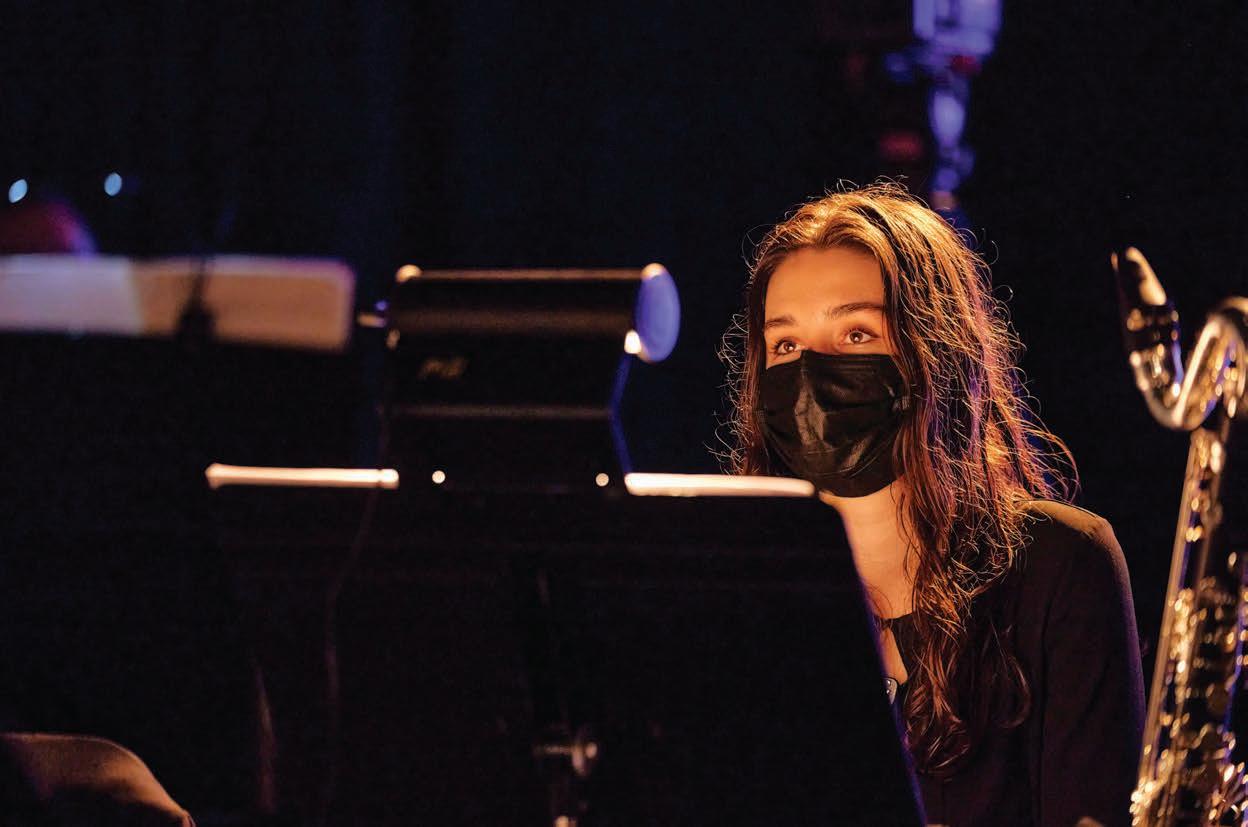Whole Notes



This issue of Whole Notes includes news and accomplishments of the 2021-22 academic year and a little beyond and marks our return to print after a two yearabsence. In that time, we have observed arrivals and departures of new and longtime community members and celebrated great news and achievements, but we have also endured the sorrow accompanying the passage of former faculty, students, and alumni.
In this issue we pay tribute to a beloved colleague, JoAnn Taricani, longtime Music History professor who served as School of Music director from July 1, 2020 until her unexpected death on February 1, 2022 (see story, page 3). In her 18 months as School of Music director, JoAnn devoted herself to keeping students, faculty, and staff safe and healthy during the ongoing COVID-19 pandemic. She made certain that students could continue to make progress toward completing their degree studies and took special care to provide access for her faculty colleagues and their students to research and performance spaces that enabled them to continue documenting their work during long periods of remote learning. Her conscientious care during those difficult times was a great gift to the School of Music community.
Friends of the School of Music
Volume 10, Number 1 Fall 2022
Editor Joanne De Pue Design Chelsea Broeder Photography Steve Korn, Joanne De Pue, Gary Louie, Cory Hiraiwa, Timothy Little, and others as credited.
Whole Notes is an annual publication of the University of Washington School of Music.
We welcome updates from School of Music alumni and faculty. Please drop us a line and share your latest news and accomplishments. We will include your update, as space allows, in an upcoming issue of Whole Notes.
Send updates to: Publicity Office School of Music, Box 353450, University of Washington Seattle, WA 98195-3450, or email musinfo@uw.edu
JoAnn’s directorship is documented more fully in our digital-only issue of Whole Notes, which combines our Fall 2020 and Fall 2021 annual reports into one twoyear pandemic-era issue. Information for how to download this report is below.
Other news this past year included the retirements of two pivotal longtime School of Music faculty members: Jonathan Bernard (Music Theory) and Patricia Campbell (Music Education/Ethnomusicology) both of whom stepped down in June 2022. They share some parting thoughts in this issue on the brink of their retirements after decades as UW faculty.
In some of the biggest news for the School of Music in many years, we are thrilled at this time to announce some upcoming major upgrades to the Music Building that will enable us to better serve our students and community. Read more in this issue and consider joining us in our campaign to make these critical improvements that will have positive and far-reaching impacts on every member of our community.
As 2022 draws to a close, we invite you to share in the stories and successes and profound gestures of generosity of the past academic year. Thank you for reading and for being part of the UW School of Music community. We appreciate your support!
Joël-François Durand Acting Director, School of Music
Please scan the code at right to download a copy of our digital-only 2020/2021 Whole Notes, combining reports for Fall 2020 and Fall 2021. The issue is also archived for download at: www.music.washington.edu/newsletter. Thank you!
Front Cover: Music Building exit.
Photo: Curtis Crohn
Back Cover: Megan Rideout-Redeker performs in the orchestra for Vinkensport.
Photo: Steve Korn

University of Washington Professor Joël-François Durand will serve as acting director of the School of Music through June 2024.
The longtime Composition professor was named interim director of the School of Music in the wake of the unexpected death on Feb. 1 of former director JoAnn Taricani (see story, page 5). College of Arts and Sciences Dean Dianne Harris announced the appointment on February 2 in an internal email to School of Music faculty and staff.
“The College leadership is committed to ensuring that the School of Music has strong unitlevel leadership during this time of transition,” Harris wrote. “We are pleased to announce that Professor Joël-François Durand has agreed to serve as interim director of the School of Music through the end of June 2022. We are grateful for his willingness to step into this role on short notice at a sorrowful and difficult time, and for his many years of experience serving as the School’s associate director.” Durand’s appointment was subsequently extended through June 2024.
A member of the School of Music Composition faculty since 1991, Durand composes works for solo instruments and ensembles and has created numerous commissioned works for significant ensembles worldwide. Recent projects for Durand include a work for large orchestra, Tropes de : Bussy, based on some of Debussy’s piano Préludes, commissioned by the Seattle Symphony Orchestra, which premiered the work in 2019. His composition Geister, schwebende Geister, for viola and ensemble (written for faculty violist Melia Watras in 2020) won first prize at the 2021 European Composer Competition organized by the Franz Schubert Konservatorium, Vienna, Austria, in the Category Chamber Music. It will be premiered in April 2023 in Seattle at the UW’s Meany Hall.
Besides being a creator of large-scale music works, Durand is also an inventor of audio equipment. In 2010, he designed and started commercial production of a tonearm for record players called the Talea, followed by development of three further models, the Telos, the Kairos, and the Tosca, all aimed at consumers of high-end audio reproduction systems. For his work at his company Durand Tonearms LLC, he was made a University of Washington Entrepreneurial Fellow in 2010.
As associate director of the School since 2002, Durand supervised the advising office and helped students resolve issues regarding grading or other academic issues. In one of his first acts as School of Music director, Durand appointed Jazz Studies Associate Professor Ted Poor to the associate director role.

Associate Professor Ted Poor has been named acting associate director of the School of Music. He succeeds former associate director Joël-François Durand, who vacated the position in early February after 20 years in the role when he was named acting director of the School of Music (see story, above).
In his new role, Poor works with the School’s advisors and students to address matters related to grades or other academic issues. A member of the UW faculty since 2013, Poor is a highly-regarded drummer whose work crosses numerous genres.
A graduate of the Eastman School of Music, Poor made his mark in the jazz and indie-rock music communities of New York City appearing on dozens of recordings and sharing stages with world-renowned artists such as Bill Frisell, Pat Metheny, Kurt Rosenwinkel, Gabriel Kahane, My Brightest Diamond, Aaron Parks, and Ralph Alessi. He is a member of the band of Los Angeles based singer/song-writer Andrew Bird, among many other projects.
At the School of Music, he is the faculty advisor for the annual Improvised Music Project Festival (IMPFest) co-presented by the School of Music and the student-run IMP, as well as a frequent collaborator with faculty colleagues across the UW’s performance and composition programs.
The University of Washington suffered a profound loss on February 1, 2022 with the sudden death of School of Music Director JoAnn Taricani. The longtime Music History professor had been experiencing health concerns, but remained highly engaged to the very end in her work at the school and in the UW community, which she had served in multiple capacities since her arrival at the University in 1980. *****************************************
Word of Taricani’s passing was shared with School of Music faculty, staff, and students the afternoon of Tuesday, Feb. 1, in an emailed message from Catherine Cole, former divisional dean of the Arts, who acknowledged the shocking suddenness of Taricani’s death as well as the wide-reaching impact of her life and work:
“JoAnn was a beloved member of the School of Music and the University of Washington,” Cole wrote. “As a researcher, she was respected for combining meticulous archival research with insights gained through live performance of historical music. As a teacher, she was known for superb pedagogy and dedication to her students. As a leader who served in a remarkable number of roles at the University of Washington, JoAnn was gifted at making clear and transparent decisions and navigating the larger organizational structures of UW, all the while keeping her eyes firmly focused on the larger values of academic excellence, innovation, integrity, and inclusion.”

Professor Taricani’s service to the UW included her ongoing work in a variety of university-level issues— budget committees, facilities planning, and membership on the Board of Directors for the UW Medical Center. She lobbied for all University of Washington faculty at the state Legislature, elected by the Faculty Senate as the faculty legislative representative for numerous legislative sessions. She also served as chair of the Advisory Committee on Intercollegiate Athletics (ACIA).
Within the School of Music, she has served as Director, Graduate Program Coordinator, and Chair of Music History. She produced early music performances through the student Collegium Musicum and in recordings with professional musicians. She was also a
dedicated and gifted teacher. Undergraduates who studied with her went on to pursue future degrees at Oxford, Columbia, and other prestigious institutions. Her doctoral graduates have led distinguished careers, including one as a curator of rare books at Stanford University.
“JoAnn Taricani’s teaching success can be attributed to the value she placed on student participation and interaction,” said Cole. “She believed this was particularly important in teaching early music, where the many styles of music are unfamiliar to students. She said of her own teaching, ‘Overall, I try to adapt each course according to what I think will expand the thinking and experience of students, whether in academic writing and research, or performance discoveries.’”
Taricani received her M.A. and Ph.D. from the University of Pennsylvania. Her research brought together intensive scholarly research of primary source materials with live performance and interpretation of those sources. Her publications took multiple forms, including traditional scholarly texts, live performances, and new audio recordings.
One of those was her collaboration with UW Emeritus English Professor Thomas Lockwood on a magnum opus: a three-volume edition of musical works on the plays of the British author Henry Fielding, published over the course of several years (in 2004, 2007 and 2013) by Oxford University Press. Taricani’s singular achievement in this project was an extraordinary feat of archival detective work, as she was able to uncover and assemble the various popular ballads that had been incorporated into Fielding’s dramas. Comprising 2,000 pages, including 200 pages of music, this publication was celebrated by colleagues as “hands down, the best edition ever published of any long eighteenth century playwright.” One of its volumes also garnered the prestigious Robert Lowry Patton Award in 2015 for the best recent study in British literary studies of the Restoration and Eighteenth Century.
Taricani’s recent projects included a musical edition of subversive songs created as a souvenir for the coronation of King Charles II of England entitled An Antidote Against Melancholy. The music from these songs had not previously been integrated with the texts and doing so revealed new facets of its history and context. Her project also included the creation of an extensive website tracing the origins and historical contexts of every song in Antidote.
She also produced a remarkable set of professional recordings of the songs, a compendium set for release as a full-length CD by Centaur Records. The extraordinary ambition and accomplishment of this project was recognized by receipt of the 2017 Noah Greenberg Award of the American Musicological Society, the highest award in Taricani’s field. Her interdisciplinary approach to scholarship was substantial in scope, path-breaking and original in content, and innovative in form.
At the time of her passing, Taricani was immersed in ongoing work alongside chairs of the academic arts units at the UW. This work included the launch of the ambitious Arts Capital Campaign to revitalize key arts spaces on campus, including significant modernizations of the School of Music’s Brechemin Auditorium, student recital hall, and corridors and common spaces (see page 27). During the past two years she also oversaw the implementation of the School of Music’s constantly shifting health and safety policies and protocols related to the ongoing COVID-19 pandemic. Her term as director of the School of Music, from July 1, 2020 to February 1, 2022, overlapped with a period of intense and rapid change in methods of learning and instruction as she shepherded the school through a complete pivot to remote learning and instruction in Spring Quarter 2020, and subsequent return to in-person instruction in Autumn Quarter 2021.
School of Music Professor Joël-François Durand was initially appointed to serve as interim director of the School of Music through the end of June 2022, with the appointment later extended through June 2024. “JoAnn Taricani’s passing has been a terrible shock for us all,” he said of his longtime colleague. “She had a significant impact in many areas of the University and the School of Music. All of us here who knew and worked with her are remembering her fondly. We will miss her laughter, her unbound energy, and her positive outlook.”
Tributes to Taricani proliferated throughout the UW Music community in the days following her passing, with students and faculty responding to the news in the best way they knew—by making music. On Wednesday, February 2, the UW Chamber Singers, led by Professor Geoffrey Boers, recorded a video tribute to Taricani: “My Flight to Heaven,” a setting of a 17th century poem by English poet Robert Herrick. The University of Washington Symphony, meanwhile, continued rehearsals for its Feb. 4 Meany Hall performance, which included a musical tribute to a most beloved and important member of the UW community.
The University of Washington Symphony Orchestra (David Rahbee, director) has been awarded the American Prize in Orchestral Performance, 2021, in the college university division (smaller program). The orchestra was selected from applications reviewed recently from all across the United States.


The American Prize National Nonprofit Competitions in the Performing Arts, administered by Hat City Music Theater in Danbury, Connecticut, was founded in 2009 by composer/ conductor David Katz and is awarded annually in many areas of the performing arts. According to Katz, The American Prize is the nation’s most comprehensive series of non-profit competitions in the musical and theater arts, unique in scope and structure, designed to recognize and reward the best performing artists, ensembles and composers in the United States based on submitted recordings.
Winners of The American Prize receive cash prizes, professional adjudication and regional, national and international recognition based on recorded performances. In addition to its 2021 win, the orchestra under Rahbee’s leadership has placed in the finals in the category of orchestral performance for each of the last three seasons, and in the category of orchestral programming for the past six seasons.
“Most artists may never win a Grammy award, or a Pulitzer, or a Tony, or perhaps even be nominated,” Katz says, “but that does not mean that they are not worthy of recognition and reward. Quality in the arts is not limited to a city on each coast, or to the familiar names, or only to graduates of a few schools. It is on view all over the United States, if you take the time to look for it. The American Prize exists to encourage and herald that excellence.”
UW School of Music professor and trumpeter Cuong Vu has performed with some of the top names in the music business throughout his acclaimed career, but one of his proudest musical collaborations, with iconic rocker David Bowie more than 20 years ago, never saw the light of day—until now.

The estate of the late Bowie recently marked the January 2022 official release of Toy, a collection of re-recordings of some of Bowie’s earliest songs plus new songs that were recorded live in studio in 2000 and scheduled for 2001 release with EMI/Virgin, but that remained unreleased due to what Bowie later termed “major problems” at the label.
Vu had been added to the lineup of Bowie’s band for the project when the artist saw him perform at a club in New York City on a bill with Holly Palmer, a friend and musical collaborator who long toured and recorded with Bowie as a backup singer and percussionist.
Palmer and Vu had been mutual fans of each other’s work since they were teenagers growing up in the Seattle area and rising stars of their respective high school jazz bands (Lake Washington High School for Palmer and Bellevue High for Vu).
Vu spent two days recording with Bowie for the Toy sessions, and his distinctive trumpet work is featured on several tracks on the album, including the title track, “Toy (Your Turn to Drive).”
In an October 2021 article in Rolling Stone, Toy producer Mark Plati singled out Vu’s work on the track “Karma Man, calling it “notable for Cuong Vu’s opening and closing lines, and especially the glorious backing vocals from Holly Palmer, Emm Gryner, and Lisa Germano — they had so much to do with the sound of Toy.... When I re-listened to these tracks, the sound of fall 2000 came flooding out of the speakers, from a song I’d not heard since then.
I’m not too proud to say I shed a bit of a tear, something that happened a few times while mixing it.”
Toy is among several posthumous releases included in a series of box sets covering different phases of Bowie’s career. The box set Toy: (Toy Box) includes the original album plus alternate versions and deluxe artwork and packaging in both CD and vinyl formats. It received its official release on ISO Records/Parlophone on January 7, 2022 (Bowie’s 75th birthday).
Count University of Washington Jazz Studies faculty Steve Rodby among the Seattle winners at the 2022 GRAMMY Awards. The School of Music artist-in-residence produced Mirror Mirror, an album of duets by jazz pianist Eliane Elias with Chick Corea and Chucho Valdés, which took home the GRAMMY in the category of Best Latin Jazz Album.
Rodby also co-produced this year’s Best Instrumental Composition winner, the late pianist Lyle Mays’ Eberhard EP. Mays and Rodby were longtime bandmates (along with Jazz Studies Chair Cuong Vu) in the highly renowned Pat Metheny Group.
Rodby’s impressive lifetime GRAMMY total now stands at 14. The musician/producer previously earned 11 of the recording industry’s outstanding achievement awards for his work with guitarist Metheny.
Steve Rodby’s residency at the UW is made possible through a 2020 grant from Seattle’s Raynier Foundation, which provided funding for a three-year artist-in-residence in bass within the Jazz Studies program. Read more about the Foundation’s support for Jazz Studies on page 26.

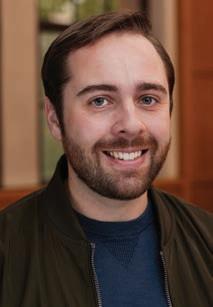
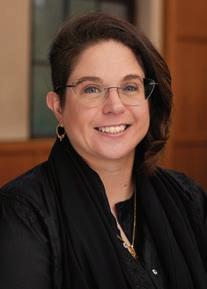
The School of Music welcomes new faculty in Composition, Instrumental Performance, Music Education, and Music Theory in 2022-23.
Jeffrey Bowen (’15 DMA, Composition; ’12 MM, Composition) joins the School of Music faculty as a lecturer in the Composition Program. A prize-winning composer of acoustic and electroacoustic music, Bowen has presented work at the New York City Electroacoustic Music Festival, the Darmstadt Courses for New Music, the International Computer Music Conference, and as a resident artist at the Atlantic Center for the Arts.
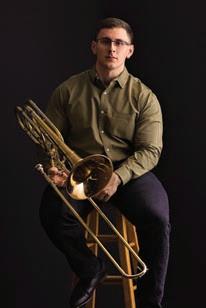
Eden Garza, a native of South Texas, joins the School of Music faculty as an artistin-residence in trombone performance. He is a newly appointed member of the Seattle Symphony as of September 2022. Garza received his master’s degree from the University of Texas at Austin and his bachelor’s degree from Texas A&M University, Kingsville (TAMUK).
Anita B. Kumar (’22 PhD, Music Education) returns to the School of Music as a visiting lecturer in Music Education. Since completing her doctoral classwork at the UW, she has served on the Music Education faculty at Georgia State University in Atlanta. Her research interests include psychosocial perceptions of teachers and conductors in large ensembles, audiovisual perception of conducting gesture, school-community engagement partnerships, and evaluation of preservice teachers.
Cellist Christine Lee joins the Strings Program in Fall 2022 as an artist in residence whose work at the school will be focused on chamber music. A Paris Fulbright Fellow, Lee splits her time between Seattle and San Francisco, pursuing a wide range of creative and musical projects. Lee is the cellist of L’arc Trio, a piano trio based in San Francisco that has been recipient of numerous grants and awards.
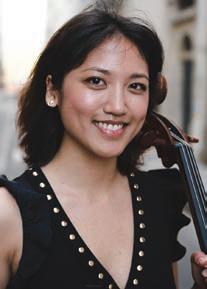
Luis Rivera (’22 MA, Music Theory) joins the School of Music faculty as a lecturer in the Music Theory program. His research interests focus on mathematical music theory, set theory, and the music of Latin America. He holds a BS in Mathematics and a BM in Piano Performance from Augusta University, and a double MM from Georgia State University in Piano Performance and Pedagogy.

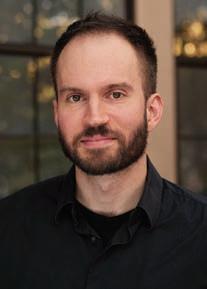
Andrew Romanick (’18 DMA, Piano Performance) works as staff pianist and opera coach at the University of Washington and as staff pianist at Seattle Pacific University. He has recently performed virtually with SPU faculty Chérie Hughes in the Barcelona Festival of Song and with Darrell J. Jordan in recitals hosted by Tacoma Opera and Wilmington Opera in Delaware.
Cellist Sarah Rommel joins the School of Music faculty in Autumn 2022. She is a graduate of the Curtis Institute of Music (B.M.) and the University of Southern California Thornton School of Music in Los Angeles (M.M.). In addition to her work as a soloist, Rommel is a founding member of the cello quintet SAKURA.
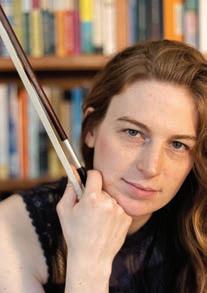 Sarah Rommel
Sarah Rommel
School of Music graduate Alexander Nam Nguyễn (’22 BM, Music Education) was front and center at the UW’s 2022 Commencement ceremony, leading College of Arts and Sciences undergraduates into Husky Stadium as one of six banner carriers, or gonfalonieres, representing the College. Students chosen for the honor are recognized for exemplifying the College’s core values of excellence, inquiry, community, accountability, integrity, and citizenship.
The Music Education graduate was nominated for the honor by his teacher, Professor Giselle Wyers, who became acquainted with the multi-talented student during his four years as a member of her ensemble, the University of Washington Chorale. “He has been one of the most loyal, engaged, and talented members of my ensemble for four years, including during the extremely challenging COVID years where he sang in a parking garage octet," Wyers wrote in recommending that Nguyễn be the School of Music's nominee for the distinction.
"The UW School of Music will always have a special place in my heart because of the richness of the culture and connections I made!” he says. "UW's Music Education faculty and choral community supported me through COVID, created a home amidst the massive campus that is UW, and prepared me for my desired career field in all the right ways. I could not have asked for better people to be surrounded by for my undergraduate experience."
Wyers has no doubt Nguyễn will excel as a music teacher, as he has in many others since she has known him.

“Alex composed a work blending jazz and classical styles for the 65 members of UW Chorale and taught them to sing it on Zoom in virtual sectionals, culminating in a beautiful final product that students cherished during a time when most of them could not even leave their homes,” Wyers wrote. “He then composed a second a cappella anthem, “Freedom Comes,” on the theme of social justice and personal freedom that was featured in our first live in-person concert in Fall 2021.” The work also was performed in June by Cantabile, a youth choir for high-school aged singers operated by Columbia Choirs of Metropolitan Seattle.
Since graduating from UW in June, Nguyễn has begun teaching choir at Beaver Lake Middle School and Maywood Middle School in the Issaquah School district. His UW education, he says, has prepared him well for this work.

“Alex is a very strong teacher who I have observed in rehearsal multiple times as our tenor section leader in Chorale and in UW Chorale methods class,” she shares. “He has a compassionate, generous spirit bringing seemingly unbounding optimism, hope, and joy into his work. “He is also extremely modest; it was only in his final weeks in school that he shared with me that he works as a professional jazz pianist at one of the top restaurants in Seattle.”
It’s true; in addition to his other accomplishments, Nguyễn may also be seen performing piano jazz at Seattle’s elite Canlis restaurant most Fridays from 5 to 7 p.m.
“Alex is a student who gives as much or more than he receives in any professional environment,” Wyers says. “I am very excited to follow his career as it unfolds in the years to come.”

The University of Washington School of Music celebrated its Class of 2022, 60 students strong, divided evenly between undergraduate and graduate students completing bachelor’s, master’s, and doctoral programs in 2022.










An in-person Grand Finale celebration at the Music Building on Friday, June 10 for graduates and their invited guests marked the first non-virtual Commencement celebration for School of Music grads since 2019.
In addition to recognition of graduating students, the program included a welcome from School of Music Acting Director Joël-François Durand, and brief remarks by graduates Christine Chu (BM Strings, BA Communication) and Tiffany Walker (DMA Choral Conducting). Graduate Megan Hutchison (MM Woodwinds), flute, performed Valerie Coleman’s Danza de la Mariposa for a capacity audience in Brechemin Auditorium.
Music Theory Professor Jonathan Bernard retired in June 2022 after 35 years on the UW School of Music Faculty. In this email interview with School of Music publicist Joanne DePue, conducted in early June of 2022, Professor Bernard reflects on a fulfilling and challenging career and looks ahead to a full schedule of post-retirement activity.

SOM: What is the first thing you look forward to doing once you are retired?
JB: My course is set for the first month or so, with a symposium cooked up by two of my former students to help usher me out, followed a few weeks later by my daughter’s wedding, followed immediately after that by a conference in Venice on “New Concepts in Harmony, 1945–1975,” part of a multi-year project that has been stalled for the past couple of years by the pandemic but is now under way again.
SOM: What are some of your proudest UW accomplishments as faculty member/chair in Music Theory?
JB: I’m proud of the graduate program that John Rahn and I managed to build, first as a faculty of two, then of three when Áine Heneghan joined us for several years. I’ve missed them both for nearly a decade now; and since they were never replaced, owing to pressures to downsize the School of Music faculty (and for other reasons that I needn’t go into here), things have never been quite the same since. But I’m proud, too, of the excellent theory students who have earned master’s and doctoral degrees here, and who have gone on to doctoral programs at other good schools or to teaching careers and scholarly achievements of their own. We had a pretty good “shop” here for a while!
SOM: What advice you would give to a new School of Music faculty member?
JB: Advocate for what you believe the mission of the School should be, and stick up for your own program; but remember that your best chances of getting something done lie in making common cause with like-minded colleagues, making an effort to coordinate your program with those being offered by others in the School. As a faculty member in Theory, I had a little success doing that with my counterparts in Composition and in Music History, though probably not enough. I could have tried harder, and in retrospect feel some regret about that.
SOM: What is something you will miss about the School of Music when you retire?
JB: I’m showing my age in saying this, I realize, but it’s what I already miss that weighs most heavily on my mind: the sense of camaraderie, of common purpose, that I found (or thought I had found) among my colleagues when I first arrived in Seattle, in 1987. The intervening years have taken their toll; I especially lament the destructive polarization that has taken hold over the past decade. The current leadership has much damage to repair, and I wish them the best—as, of course, I wish all my soon-to-be-former colleagues, whom I will miss running into on a daily basis. They will, I hope, all lend a hand in rebuilding unity.
SOM: What music are you listening to these days in your down time (if any)?
JB: It’s never really “down time” when I’m listening to music, because one has to pay close attention no matter what it is. Whether it’s Elliott Carter’s Penthode, or Toru Takemitsu’s solo piano music, or Walter Piston’s symphonies, or recent albums by David Sanford and Tyshawn
Sorey, or some of Bill Frisell’s past vast discography—to list a more or less random sampling of stuff that’s been in my CD player lately. To paraphrase Yogi Berra: You can hear a lot just by listening!
SOM: What are you reading? What do you plan to read next?
JB: Currently in progress (partial list): Pierre Boulez, Music Lessons; Galileo, Dialogue Concerning the Two Chief World Systems (the book that got him into all that trouble); Graham Greene, Stamboul Train; Saul Bellow, Collected Stories. Once I finish these, it will be time to choose a Summer Classic for 2022, something I’ve done for the last 25 years or so—working away at my literary bucket list. Many attractive possibilities beckon; one leading candidate is Francis Parkman’s France & England in North America, which chronicles Europeans’ early explorations of our continent.
SOM: You’re stranded on a desert island and have with you just one piece of music or one album. What would it be?
JB: Horse Sings from Cloud, by Pauline Oliveros. This piece, on infinite repeat, ought to be ideal for inducing a suitable state of serenity until I either expire or am rescued.
SOM: What is something about you that might surprise people who don’t know you well?
JB: That I’m not much of a specialist, in the usual musicological sense. Not to make a virtue of necessity: I just get bored by doing the same thing for too long. My list of publications no doubt reflects this.
What is something a UW faculty member said or did that you will never forget?
JB: On the occasion of his retirement in 1994, Jim Beale reminisced about his early years on the School of Music faculty, way back in the late 1940s I believe, when one by one his senior colleagues were reaching retirement age and departing the scene. Jim said, “I couldn’t imagine ever getting that old myself. But now here I am, and let me tell you, it will happen to you too, in the fullness of time.”
School of Music faculty member Frederick Reece received a First Book Manuscript Award as part of his recruitment to the University of Washington as an assistant professor in the Music History program.
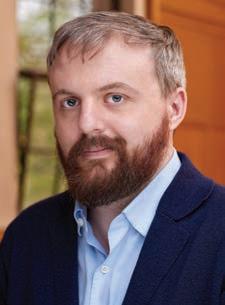
Reece’s permanent appointment became effective in Autumn 2021, and prior to that, he served a year as visiting lecturer in the program.

Reece completed his PhD at Harvard University with his dissertation, “Ringing False: Music Analysis, Forgery, and the Technologies of Truth.” He has published on the issue of forged compositions in his article “Composing Authority in Six Forged ‘Haydn’ Sonatas,” in the Journal of Musicology.
His current research explores the works of canonical western composers such as Haydn, Mozart, and Schubert as emulated by musical forgers, from the eighteenth century to the present day. A book on the subject, titled Forgery in Musical Composition: Aesthetics, History, and the Canon, is under contract to Oxford University Press.
The First Book Award, sponsored by the School of Music and the UW Simpson Center for the Humanities, brought two distinguished scholars to campus this past December for an in-depth discussion with Reece about his book manuscript. James Currie (University at Buffalo—SUNY) and Melanie Lowe (Vanderbilt University), the two visiting scholars, also presented a colloquium on forgery, identity, and authenticity in musical composition as part of the School of Music’s THEME lecture series.
Music Education Professor Patricia Shehan Campbell retired in June 2022 after 33 years as a faculty member in the School of Music.
C ampbell held appointments in Music Education and Ethnomusicology and served as chair of both programs at various times in the past decades since her arrival at the UW in 1989. Under her oversight the School of Music initiated and shepherded a longstanding partnership of 28 years with Laurelhurst Elementary School to place UW graduate students in the classroom to provide music instruction to young students.
Campbell also oversaw for 23 years the Music Alive! In the Yakima Valley program, which yearly sends UW graduate students to eastern Washington to work with students in the Yakama Nation Tribal Schools.
Together with her UW students and faculty colleagues, she has authored numerous books, articles, and other publications for presentation at conferences around the world and in leading academic journals in the fields of world music pedagogy and music education.

This interview between Professor Campbell and School of Music publicist Joanne DePue was conducted in June 2022 via email.
What is the first thing you look forward to doing once you are retired?
Going off-the-grid, remote, probably up to the mountains ASAP.
Can you elaborate on what you mean when you say you’ll have more time for your own music once you are retired?
Back to Bach! I need to play (piano) again, regularly. I look forward to returning, too, to time on my Japanese koto and Irish harp.
What advice would you give to a new School of Music faculty member?
Continue to go deep into specialized study, whether as an artist, composer, scholar, or educator, and innovate, invent, and hone new perspectives within the specialization. At the same time, look for the nexus between the specializations, the overlaps and commonalities, so that we might “stick together” in making a solid statement on music’s place here at the university and its role and importance in society at large.
What is one thing you will miss about the School of Music (or the UW) when you retire
Oh my, the people! We’ve all been missing the people, in 3D—faculty, staff, and students—since March 2020. The upside is that I’ll have 33 years of “people-stories” that I can carry with me everywhere I go.
What music are you listening to these days in your down time?
A barrage: Beausoleil, Dakha Brakha, Hukwe Zawose, Ivo Papasov, Kirk Franklin, Leenalchi, Mariachi Vargas, Nickel Creek, Rhiannon Giddens, Ulali, and a few choice pieces by J.S. Bach, Bartok, and Debussy.
You’re stranded on a desert island and have with you just one piece of music or album. What would it be?
Joni Mitchell: Blue, not only for its genius as a song cycle, but because it was the go-to music for me in my formative years, when every tune was on my set-list for the circuit of university folk clubs in which I played…in another life.
How has being a university professor changed you?
University “professor-ing” can remove us from the joy of music (making). Teaching is surely satisfying, and we frequently find ourselves energized by the new ideas our students develop in courses
and through their research endeavors. Over the years, I’ve shifted into the role of a teaching musician, singing, playing, and dancing with students the music that they take with them into their own teaching. I’ve learned that at the university level, we give and we take, such that students teach their profs, too, and profs learn tons from their students in music, about music, and on the process by which we learn music. I’ve also found myself in the world of words here at the university, and have enjoyed the privilege of research and writing on topics of music in the lives of children, music in community, and the pedagogy of world music.
What is one thing a UW faculty member said or did that you will never forget?
More than what they’ve said, I’m buoyed by the genuine commitment of colleagues to musically educating our undergraduate and graduate students in Music Education and Ethnomusicology. In particular, I recall the endless energy of Barbara Lundquist, professor emerita in Music Education, who hired me in 1989, and the steady-state and on-target professionalism of Christopher Roberts, current director of Music Teacher Education; I’m forever inspired, influenced, and uplifted by their infinite devotion to developing students as musicians, teachers, and scholars. I’m especially fond of Marisol Berrios-Miranda, affiliate faculty colleague in Ethnomusicology, a phenomenon within our midst, too, and I treasure the beautiful demonstrations of her belief that “to know the music, you must feel the music (in your body).”
What is your greatest hope for your past and current students?
That they will strike the balance of “home and school” and give attention to their personal, professional, and civic lives. My advice for those in university teaching is to recognize the privilege of working in music and with vibrant students, and to strive to understand colleagues as the interesting and inventive people that they are.
What are some of your proudest UW accomplishments as faculty member/chair in Music Education and Ethnomusicology?
That we’d hired Steve Demorest (1994) and Steve Morrison (1996) in Music Education, and Shannon Dudley (1996) and Christina Sunardi (2008) in Ethnomusicology.
That in Music Education, we continued an historic emphasis on musical-cultural diversity, developed a research-based MA program, and established (in 1994) the PhD program for research in music in teaching and learning.
That we’ve graduated well over 500 “teaching musicians” to school positions since 1989, and have placed 40-plus PhDs on university faculties across the U.S., Canada, Europe, and Asia.
That we’ve hosted Fulbright and government-sponsored scholars for up to a year’s residency with us in research and teaching from Australia, Bulgaria, France, Germany, Hong Kong, India, Ireland, Italy, Japan, Kenya, Korea, the Netherlands, Norway, South Africa, Spain, and the U.K.
That we developed, in 2014, two three-year partnership programs in Music Education through the UW Office of Global Affairs with the University of Dar es Salaam (Department of Performing Arts), Tanzania, and Gitameit Academy in Yangon, Myanmar.
That we initiated a partnership in 1994 with Laurelhurst Elementary School, now running 28 years, in offering a first-class musical education to children, much of it devoted to the development of their intercultural understanding through experience and study of music from across the world.
That we established in 1999 a 23-year program called “Music Alive! In the Yakima Valley,” bringing music to children and youth in Toppenish, Harrah, and White Swan, thanks to external funding of $500,ooo. Since 2015, we’ve shifted the program to collective songwriting such that students at the Yakama Nation Tribal School are musically expressing their identities and values through the songs they write together with the facilitation of our graduate students in Music Education and Ethnomusicology.
That in Ethnomusicology, we’d introduced the BA in Ethnomusicology (2012)—one of very few in the country, and re-charged the Visiting Artists in Ethnomusicology program so that our students have opportunities to learn from world-class A-to-Z artist musicians, quite literally from Afghanistan (Homayoun Sakhi) to Zimbabwe (Dumisani Maraire), and from artists in local cultural communities. That we purchased in 2012 a beautiful Javanese gamelan and arranged for the crafting of Shona-style Zimbabwean marimbas to the specifications of specialists in the music.
That we’ve developed a symbiotic relationship between Music Education and Ethnomusicology like no other university on the planet, such that students in the two programs engage together in the study of music and its role in developing human relationships through expressive musical practice.
What are your immediate plans for the future past June 30? This summer will be my eighth visit to Tanzania, this time for a book contracted by Taylor and Francis, followed by time in Norway in late August for an invited keynote at a meeting of musicologists on the topic of children’s musical cultures.
I’ve been offered the Distinguished Chair in Arts and Social Sciences at Carleton University, Ottawa, Canada for 2022-23, so will be locating myself there for research on the presence of music and the arts in the enculturation of children in Indigenous First Nations communities. I’ve accepted the invitation for a return visit as guest lecturer in Ethnomusicology and Education at the University of Ljubljana, sometime in the next year.
I’ll continue on as educational consultant to Smithsonian Folkways Recordings and board member of Alan Lomax’s Association for Cultural Equity (and his Global Jukebox). Future plans include longer swims, weekday-hikes, reading outside the field, fewer emails, and more music.
Any other last thoughts you’d like to share?
In these challenging times, the sustainability of university programs in music and the arts is frequently in question and yet all the more necessary.
My hope is that here at the UW, there can be strong support of School of Music efforts to hone the artistic-expressive dimensions of our human potential, to offer students an understanding of music’s place in human history, heritage and culture, and to prepare music majors not only to perform but also to facilitate music-making experiences for children, youth, and adults in our schools and communities.
Our programs in Music Education and Ethnomusicology, from undergraduate studies to the PhD, are at the core of these efforts, and will require the support of administrators who will stand behind the university’s declared valuing of the pursuit of global engagement and human connectedness through music, and the fostering of cuttingedge scholarship in music.
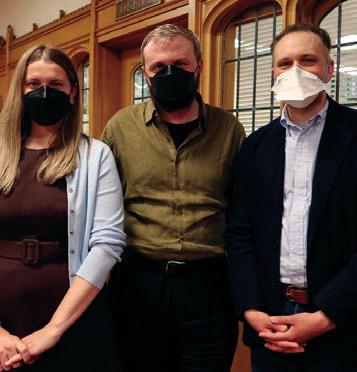
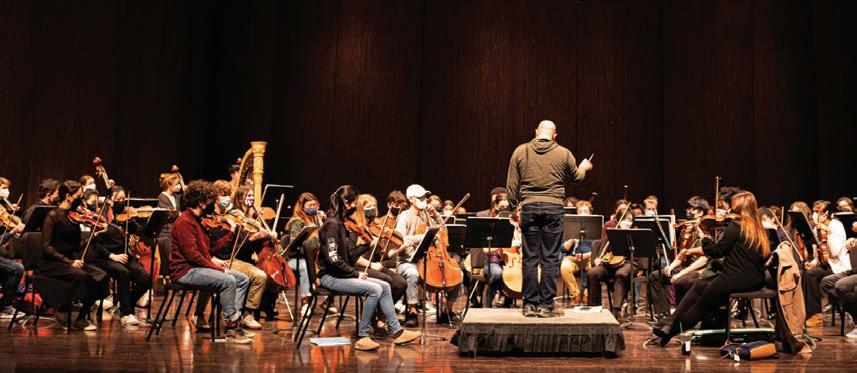
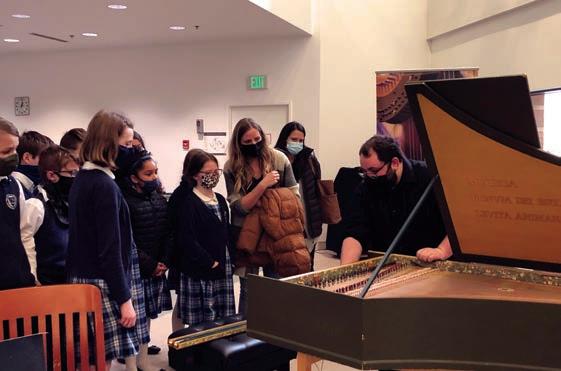
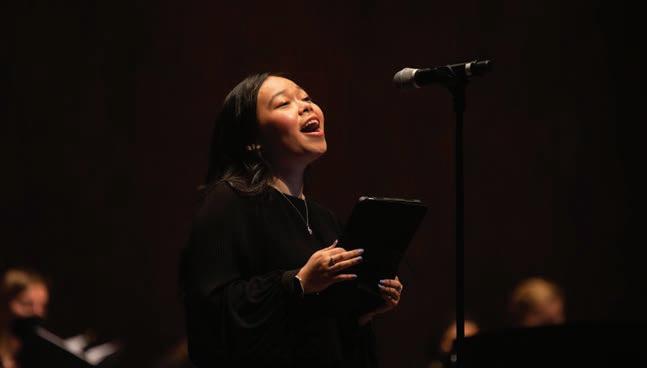
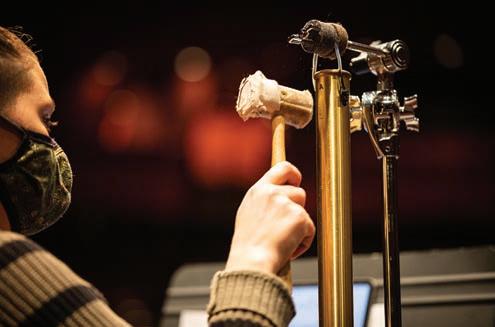
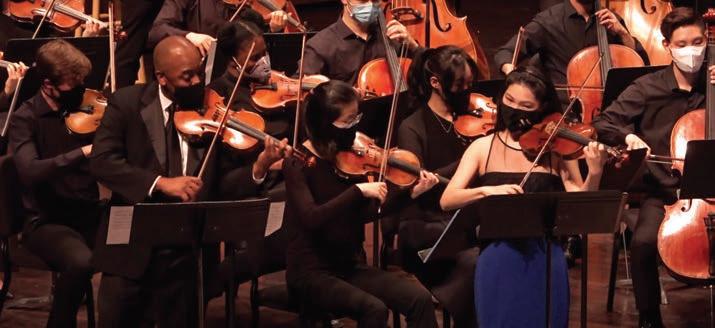
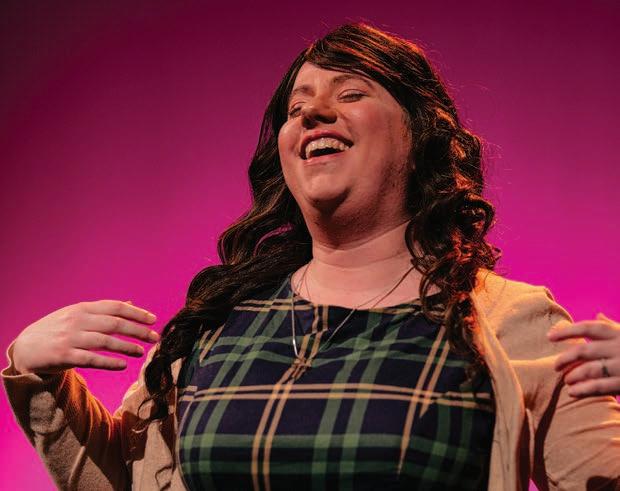
1. Voice student Karen Dunstan in Vinkensport, Meany Studio Theater in Spring 2022.
2. Guest violinist Quinton Morris joined faculty violinist Rachel Lee Priday in performing with the University Symphony Orchestra at Meany Theater in Autumn 2021.



3. Percussionist Sophie Chin (‘22 BM, Percussion) in orchestra rehearsal at Meany Hall, Winter 2022.
4. Students from the UW Baroque Ensemble performed at the Allen Library in a lunchtime concert and demonstrated for visiting school children the inner works of a harpsichord.
5. Voice student Mavis Chan performs at the spring quarter concert by the Chamber Singers and University Chorale, May 2022.
6. Music History faculty (left to right) Anne Searcy, Frederick Reece, and Mark Rodgers made a safe appearance at the School of Music Grand Finale, June 2022.
7. The UW Symphony (David Alexander Rahbee, director) in rehearsal at Meany Hall, February 2022.
8-10. Concerto Competition Winners Hannah Chou (with Professor Ron Patterson), Megan Hutchison (with Professor Donna Shin), HyeYeon Kim and alternate David Lim (with Professor Craig Sheppard).

11. Heri Purwanto, Spring Quarter Ethnomusicology Visiting Artist.

12. Masks remained a frequent sight at rehearsals and performances throughout the 2021-22 academic year.

13. UW Guitar student Jenny Cooper performed in a master class at the 2022 Northwest Guitar Festival. She took second place in the festival competition.
14. An in-person celebration of the Class of 2022 brought students and families back to the Music Building after a two-year absence.

UW Music faculty report new publications, recordings, appointments, presentations, and more in their recent work at the UW and beyond.
Professor Boers conducted the National Association of Music Educators National Honor Choir this past winter. The choir of 240 singers from all fifty states met over a weekend via Zoom and created two virtual choir videos, along with rehearsals, master classes, and vocal study. Boers was inducted into the Washington Music Educators Association Hall of Fame in February 2022, noted for his contributions to choral music education, and in particular his work to help teachers navigate the challenges of teaching choir remotely.
The faculty saxophonist was recently named full-time artistic director of the Seattle Repertory Jazz Orchestra (SRJO), the professional big-band orchestra he co-founded in 1995 with colleague Clarence Acox. Since its founding, Brockman and Acox have been co-artistic directors of the nonprofit organization with Brockman serving additionally as executive director, handling all the business and administrative functions. Now, after nearly three decades of splitting his time between the two roles, Brockman will focus exclusively on conceiving, developing, and implementing the artistic vision of the organization.
Music Education Professor Patricia Shehan Campbell, who retired in June 2022, wrapped up her UW career with a multitude of scholarly and pedagogical activites. She delivered a series of four keynote presentations on World Music Pedagogy for the National Association for Music Education (NAfME) in February 2022. She delivered the keynote address for the 12th annual conference of the Pan African Society for Musical Arts Education, drawing artist musicians, composers, music scholars and educators from across the African continent to attend the conference, which had as its core theme, “Equity, Diversity, and Access in Musical Arts Education.”
Campbell was named inaugural chair of the education committee for Smithsonian Folkways Recordings, and is a continuing member of the board of the Association for Cultural Equity that works with the repatriation of the recordings of Alan Lomax to the families of musicians from his 1959 “southern journey.” The Society for Ethnomusicology presented her with an Honorary Membership at the Society’s Oct. 30, 2021 virtual meeting, in recognition of her ongoing contributions to the field of Ethnomusicology.
Faculty composer and School of Music director Joël-François Durand produced a number of recordings of his music in recent months: the Mivos Quartet (New York) recorded his first String Quartet (2005, rev. 2018) in Vienna (Austria) and the Quatuor Bozzini (Montréal) recorded his Second String Quartet Canto de Amigo (2020). Both recordings were made in summer 2021.
In October 2021, Chicago-based ensemble Dal Niente recorded two works: In the Mirror Land (2004), for flute and clarinet; and Geister, schwebende
Geister (2020) for viola and ensemble. Geister, schwebende Geister was then mixed and edited by producer extraordinaire (and School of Music faculty member) Steve Rodby. Also in October 2021, the violinist Olivia De Prato recorded in Vienna, Austria, Durand’s work for solo violin, In a weightless quiet (2020).
His work for clarinet and violin, La mesure de l’ange (2022), was recorded in Vienna, Austria, in September 2022 by Austro-Italian violinist Olivia De Prato (known for her work with the Mivos Quartet) and Hungarian clarinetist Szilard Benes (Schallfeld Ensemble). The piece was written for the 70th birthday of Durand’s UW faculty colleague Jonathan Bernard, who retired from teaching in June (see story, page 9). The work premiered at the UW in June 2022 at a symposium in Bernard’s honor, performed by alumnus Luke Fitzpatrick (DMA, violin) and clarinetist Rachel Yoder.
Durand’s piece Geister, schwebende Geister, for viola and ensemble (written for faculty violist Melia Watras in 2020) won First Prize at the European Composer Competition organized by the Franz Schubert Konservatorium, Vienna, Austria, in the Category Chamber Music (7 to 12 players). Second prize in the competition went to Durand’s former graduate student (and current School of Music Composition faculty member) Jeffrey Bowen.
Anita Kumar, Music Education
The School of Music alumna returned to the UW in Autumn 2022 as a visiting lecturer in Music Education. She joined several current Music Education doctoral students in presenting at the National Association for Music Education National Conference this past November in National Harbor, Maryland. Her topic: “Perceptions of Trust in Conductor-Ensemble Interactions through Rehearsal Observation.”
Robin McCabe, Piano
Professor McCabe has been appointed artistic advisor of the Beijing Royal School (BRS), a private school founded in 2003 including enrollments in K-12. BRS is the first international school in China to open a studyabroad arts program. It is now developing a middle and high school arts curriculum. Professor McCabe will be working in tandem with arts faculty in Beijing, arranging faculty exchanges, visitations, residencies, and master classes, as well as providing on-site advice and tutorials to develop an intensive arts curriculum.
Professor McCabe and Professor Craig Sheppard were recently appointed to the Michiko Morita Miyamoto Professorship in Piano at the UW for the term 2021-24. Established by the extended family of the late, legendary Seattle-area piano instructor Michiko Miyamoto, the professorship supports the professors’ research and teaching activities, enabling them to provide performance opportunities for their students, bring guest artists to the UW for concerts and master classes, and advance their own artistry and research (see story, page 25).
Professor McCabe served on the jury, online, of the Vancouver International Piano Competition this past September. In October she performed a recital for Seattle’s Skyline Community, dedicating a new Steinway acquired by the residency. In March 2022, McCabe traveled to Hilton Head, South Carolina, to serve on the competition jury for the Hilton Head International Piano Competition. One of the leading international piano competitions in the United States, the competition events draw applicants, artists, and audience from countries the world over.
Michael Partington, Guitar Head of the UW’s guitar program performed music of living composers at two festivals this past summer: As a featured artist at the Shenandoah Valley Bach Festival in Virginia he performed Leo Brouwer’s Concerto “From Yesterday to Penny Lane,” as well as “Motherlands” and “Watts
Chapel” by Stephen Goss. “Motherlands” was premiered by Partington and faculty saxophonist Michael Brockman in Brechemin Auditorium in 2019.
At the Guitar Foundation of America (GFA) festival in Indianapolis, Partington premiered “Hearing the Thing Itself,” a new 30-minute solo work for guitar by Bryan Johanson. He also served on the final round jury for the GFA International Concert Artist Competition, the most prestigious competition of its kind in the world. Partington was recently elected to the GFA Board of Trustees.
After a summer of livestream performances, Partington made a welcome return to inperson concertizing in Eastern and Southern Washington in October, with an appearance on KING FM’s Northwest Focus Live and a solo performance at Nordstrom Recital Hall. He performed Roberto Sierra’s Fantasia Corelliana in recent performances with the Bellingham Symphony Orchestra and Northwest Sinfonietta.
The Jazz Studies faculty drummer performed with one of his musical heroes, John Scofield, at The Echo nightclub in Los Angeles this past November, appearing with the group Scary Goldings feat. John Scofield. “Scary Goldings is made up of another band called Scary Pockets, plus pianist/organist Lary Goldings,” Poor explains. “Scofield is a legend who has played with Miles Davis, Herbie Hancock and many others. Also joining us is Will Lee on bass (Late Night with David Letterman). I’m really excited to play with these amazing musicians, particularly Scofield. I have admired his sound and musicianship since I first heard him on recordings when I was in high school.”
David Rahbee’s arrangement of the Schumann Piano Concerto in A minor (first movement) for 8 trombones was recently published by Warwick Music and is dedicated to long-time Chicago Symphony Orchestra bass trombonist Charles Vernon.
Rahbee recently celebrated the publication of Daniels’ Orchestral Music, Sixth Edition, which he co-authored with David Daniels and David Oertel (Rowman & Littlefield, June 2022). Considered by many to be the gold standard for all orchestral professionals—from conductors, librarians, programmers, students, administrators, and publishers, to even instructors— seeking to research and plan an orchestral program, whether for a single concert or a full season.
Dr. Rahbee was awarded first prize for conducting in The American Prize national non-profit awards in the arts and was awarded second prize for Orchestral Programming, for his work with the UW Symphony. He has placed among the winners for orchestral programming for each of the seasons since his arrival at the UW in 2013. The UW Symphony under his direction also tied for third place in the category of Orchestral Performance.
Recently, Dr. Rahbee was a guest speaker, together with affiliate professor and former Seattle Symphony Music Director Ludovic Morlot, for an online seminar as part of the modified online summer session of the Pierre Monteux School and Music Festival, discussing the partnership they enhanced between the UW and Seattle Symphony.
Music History lecturer Mark Rodgers has been organizing an oral history project called Musical Work in the Time of COVID-19, in collaboration with the Labor Archives of Washington (LAW) and the intrepid students in his Music and Labor class. Rodgers and his students have been conducting interviews with musicians and music teachers in Seattle and around the country about how the pandemic has affected them in their work. LAW has already published ten of these interviews online, which are now publicly accessible at www.musicalwork.org, with more to follow soon. Rodgers also redesigned the School’s Concert Season course for the 2020-21 academic year, highlighting the extraordinary work of School of Music faculty and student groups, as well as prominent local arts groups, in continuing to stage new performances safely throughout the pandemic. The course’s required concerts featured many School of Music faculty, current students, and alumni. He also taught a new course of his own design, “Music, Birdsong, and the Limits of the Human,” in the UW Honors Program.
Renowned oboist, author, and longtime former School of Music Professor Laila Storch Friedmann died on December 2, 2022 on Orcas Island, Washington.She was 101.
Professor Storch had a pathbreaking career, the first woman to graduate from the Curtis Institute of Music in oboe (after initially being turned down for admission because of her gender), then building a career as an oboist in the 1940s and 1950s, in the United States and Europe.
Her orchestral positions included the National Symphony, the Kansas City Philharmonic, the Chicago Little Symphony, and the Puerto Rico Symphony Orchestra. In 1948 she was offered the position of Principal Oboe of the Houston Symphony Orchestra, pioneering a path for women in prominent orchestral positions throughout the country.
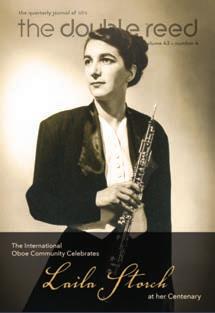
Laila performed in the Marlboro, Carmel, and Bethlehem Bach Festivals and for seven seasons at the Casals Festival. Throughout her career she worked with Sir Yehudi Menuhin, Efrem Kurtz, Pablo Casals, Bruno Walter, Leopold Stokowski, Dimitri Mitropoulos, Sir Thomas Beecham, and her favorite conductor of all, Ferenc Fricsay.
She joined the quintet the Soni Ventorum at the Conservatory of Music in Puerto Rico in 1965, and came to the University of Washington with the quintet when it was hired in 1968 as a resident ensemble at the School of Music.
Her career at the UW included the teaching of many student oboists, along with numerous performances each year as a soloist and ensemble player, on campus and around the world.
She retired in 1991, but remained very active both as a musician and author, writing the definitive biography of one of the leading oboists of the 20th century, her teacher at Curtis, Marcel Tabuteau (Marcel Tabuteau, Indiana University Press, 2008; paperback edition, 2018).
Laila’s family plans a celebration of her life at a future date.
Above: The Double Reed featured Laila in a cover story celebrating her life and career when she reached the age of 100.
Professor Salzman is contributing author to a soon-to-be-published book entitled Arnold Jacobs - Artistic and Pedagogical Legacies. Mr. Jacobs was tubist in the Chicago Symphony Orchestra for 44 years and is widely regarded as one of the foremost wind instrument pedagogues of the 20th century. Each of the 24 essay-contributing authors, all former students of Mr. Jacobs, are from major professional orchestras and leading music schools from throughout the world. Professor Salzman is the only wind ensemble conductor asked to contribute to the book.
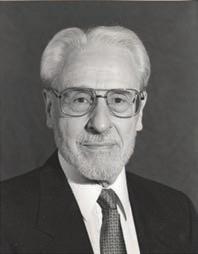
In early February 2022, Salzman initiated the first-ever Mid-Winter Band Directors Workshop, an opportunity for school music teachers to come to the UW campus for master classes and an opportunity to rehearse and conduct one of the four UW bands in concert. Eighteen school band directors from Puget Sound participated. Salzman also served as an adjudicator and master class presenter at the Music for All Western Region Concert Band Festival in Salt Lake City, Utah in March 2022, working with 22 school bands in performance and master class settings. At the request of Tshinghua University (Beijing, China), Salzman contributed a chapter to an upcoming book regarding the musical life of the Tsinghua University Symphonic Band, which he has guest conducted numerous times. Tsinghua University is a global innovation partner of the University of Washington.
Assistant Professor of Music History Anne Searcy contributed a chapter on choreographer Alexei Ratmansky to the Oxford Handbook of Contemporary Ballet, which appeared in print in April 2021.
Voice faculty Carrie Shaw is featured on Ensemble Dal Niente’s most recent release, object/ animal, on Sideband Records. The album includes work by Jeff Parker, Murat Çolak, and LJ White. The album is out now on Bandcamp. In other activities, Shaw traveled to Pittsburgh in June to premiere the role of Christlieb in Julia Werntz’s new microtonal opera The Strange Child with Quince Ensemble and Kamraton.
In Spring 2021, Shaw was busy recording major new works by a number of composers, including Alec Hall (NYC), Andile Khumalo (Johannesburg, South Africa), and Osnat Netzer (Chicago) with Ensemble Dal Niente. In addition, Carrie recorded a concert, featuring women’s quartet Quince Ensemble singing premieres of works by Courtney Bryan and David Reminick, with Chicago Symphony Orchestra (CSO). Quince Ensemble held a virtual education residency for composers at the University of Chicago in 2021; it continued in-person in 2022. Shaw also wrapped up a fruitful year of research and commissioning as a Mellon Fellowship recipient, looking into creative alternatives for self-accompanying the voice in an era where singers had limited ability to make live music with others.
Faculty pianist Craig Sheppard was featured on WWFM (New York) in November 2021 in a program highlighting aspects of his life and his musical philosophy, interspersed with selections from his CDs over the past ten years. The program was part of a series by the pianist, critic and composer Jed Distler. In March 2022, Sheppard performed a recital and taught at the Jerusalem Music Center at the behest of renowned concert pianist Murray Perahia. Professor Sheppard sat on the jury of the prestigious Arthur Rubinstein International Piano Master competition in Israel this past year. The first two rounds were held online from April 1-10, with the 32 selected contestants (from over a hundred entries) having pre-recorded their two recitals in venues in New York, London, Berlin, Beijing, and Tel Aviv. With colleague Dr. Robin McCabe, Sheppard hosted the twelfth Seattle Piano Institute from July 6-13, this year completely online for both sessions.
The composer and former longtime School of Music professor died July 10, 2021 at the age of 102. Professor Kechley and his wife, Betty, had deep connections to the School of Music. Both attended the University of Washington to study music, and Professor Kechley had a significant impact on the School in his 32 years as a faculty member in composition and as the conductor of the Madrigal Singers.
Gerald Kechley, a Seattle composer, long-time University of Washington professor, and church choir director, died July 10 at the age of 102. He was born in Seattle into the family of pianist Louella and pastor Edward Kechley. Music, family and church were the keystones of his biography.
He is survived by his three sons, David Kechley of Williamstown, Massachusetts, and Robert and Stephen of Seattle. Another son, Peter, died in 1995, and he lost his wife of 69 years, Betty, in 2011.
Until the last months of his life, he continued to write and arrange music, which he loved from boyhood when he idolized older brothers who rehearsed on an array of instruments in their living room and played in a dance band around the community.
He went on himself to sing, play, and study music at UW. After stints at the University of Michigan and Centralia Junior College, he returned to a 32-year career as professor of composition at his alma mater. The University Archives is the home now of the Gerald Kechley Collection, an eclectic body of work that includes 23 boxes of symphonies, orchestral and choral pieces, church and Christmas music that came from his years at Seattle’s Greek Orthodox and East Shore Unitarian churches, plus two operas done with his brother Elwyn.
For his 100th birthday, the UW School of Music hosted a celebration that featured his music and many stories about a career that included study under Aaron Copland at the Tanglewood Music Festival in Massachusetts, shepherding his three sons into music, and travel abroad.
One of his devoted UW students, Joan Catoni Conlon, established an endowed fellowship at UW partly in his name to support students earning advanced degrees in choral conducting. The Kechley family also welcomes donations to the Gerald and Betty Kechley Endowed Scholarship set up to give grants annually to UW composition students.
Obituary from the Sept. 8, 2021 Seattle Times
The faculty pianist was recently a juror for the CINTAS Foundation Fellowship Competition, which is awarded to artists and musicians of Cuban descent. Recent performances included a world premiere by Anahita Abbasi with the Seattle Modern Orchestra, and performances with the Seattle Symphony for the orchestra’s Opening Night Gala, and for performances of Charles Ives’ “Three Places in New England.”
Faculty violist Melia Watras’s article Concentric and Intersecting Circles of Connection: Two Compositions for Viola Solo was published in the most recent issue of the Journal of the American Viola Society. Watras’ compositions received numerous performances over the summer, including world premieres of Blue Rose for viola solo, performed by Rose Wollman at the American Viola Society Festival, and 3 Songs for Bellows, Buttons and Keys for accordion, performed by Jeanne Velonis at the Accordion Seminars, presented by the Accordion Global Association (YouTube livestream). Both works were recorded and released; Blue Rose appears on Wollman’s album LOOP: Ligeti’s Inspiration & Legacy (Acis Productions) while 3 Songs for Bellows, Buttons and Keys was released by Planet M Records.
Watras recorded two albums of solo works and chamber music by Anne Leilehua Lanzilotti, Melia Watras, and Frances White, with Grammy-winning producer Judith Sherman. The albums will be released at a later date. Her chamber group, Frequency, performed with Gabriel Kahane on the Seattle stop of his Magnificent Bird tour. Melia Watras’ recent composition The almond tree duos was given its world premiere on February 15, 2022 by Watras and violinists Tekla Cunningham, Rachel Lee Priday, and Michael Jinsoo Lim. The work will be recorded for a future album. Other recent world premieres featured Watras’s work as a violist and a composer. On April 11, 2022, three of her compositions were debuted: Hertabuise for narrator and violin; 5 Poems of Herbert Woodward Martin for narrator, violin and viola; and Weeping Pendula for voice and loop pedal. Watras’ A brazen butterfly alights for viola solo, harp and strings was given its world premiere with the composer on viola, harpist Valerie Muzzolini, conductor David Alexander Rahbee, and the University of Washington Symphony Orchestra.
Her album String Masks was released on Planet M Records on February 11, 2022. Featuring compositions by Watras, the album includes performances by Watras and her colleagues Charles Corey, Sheila Daniels, Jose Gonzales, Michael Jinsoo Lim, Rhonda J. Soikowski, Sæunn Thorsteinsdóttir, and Bonnie Whiting. The faculty violist was one of three guests, alongside Midori and Pinchas Zukerman, at the Fresno State Violin and Viola Festival (virtual) in May 2021. In October, she taught as guest viola professor at the Jacobs School of Music at Indiana University, giving viola lessons, a viola master class, and teaching a class for the Pacifica Quartet’s String Quartet Seminar.
Chair of Percussion Studies/Ruth Sutton Waters Associate Professor Bonnie Whiting joined New York City-based Talea Ensemble in Finland for the Time of Music Festival this past summer. The group presented the world premiere of Mark Applebaum’s Venture Capital Punishment, an evening-length theatrical/multimedia work, and gave a concert of the music of Julius Eastman.
Whiting subsequently traveled to Bologna, Italy, for performances in celebration of the Iannis Xenakis centennial with bass-baritone Nicholas Isherwood for ensemble FontanaMix’s #PortraitXENAKIS festival. She also held residencies at Dartmouth College and Stanford University for the development and first performances of The Ritual of Breath is the Rite to Resist, a new chamber opera centered on the murder of Eric Garner. This project includes participatory action and community ritual, inviting audiences to rise up against the theft of Black breath, to meditate on our shared humanity, and to join in the agency of shared resistance.
Joe Santiago, el bajista con Timba, passed away in Miami on January 28, 2022. The cause of death was cancer.
Jose Santiago was born in Naranjito, Puerto Rico, and raised in the South Bronx, New York, where he learned music in public schools. He went on to become one of the most sought-after bass players in salsa and Latin jazz, playing and recording with influential Latin dance bands and musicians of the 1960s through the 1990s, including Machito, Mario Bauzá, Carlos “Patato” Valdés, Tito Puente, Eddie Palmieri, Celia Cruz, Joe Quijano, Willie Colón, Rubén Blades, Héctor Lavoe and La Sonora Ponceña, to name just a few.
In junior high school, Joe’s first instrument was the viola, given to him to play in the string ensemble at PS 139 in the Bronx. He became friends with another boy who played trumpet, though, and was inspired to play trumpet himself. After shining shoes and delivering groceries for weeks to save money, Joe bought his own trumpet. He and the boy, whose name was Willie Colón, started their own group and by the time they were in high school both of them were playing trombone.
Their band gigged at community centers and at local dance halls such as the Hunts Point Palace, where they opened for headliners like Tito Puente and Eddie Palmieri. Joe played trombone on Willie Colón’s first two albums, El Malo and The Hustler, before joining the navy in the late 1960s. Upon leaving the military in 1971, Joe turned his attention to learning the bass, the instrument for which he became famous.
He began to gig with top bands, including Machito and Tito Puente. During the same time he used the GI Bill to do correspondence courses in music at the Manhattan School of Music, SUNY, and Berklee College of Music. By the mid1970s he was one of the most sought-after bass players in the burgeoning salsa scene, playing with Larry Harlow, Ismael Miranda, and others in New York, and with la Sonora Ponceña in Puerto Rico. During the 1990s and early 2000s, at the peak of his craft, Joe anchored Eddie Palmieri’s band for over a decade.
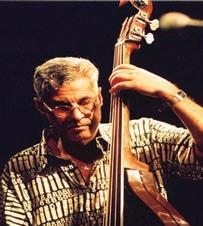
From 2005 to 2007, Joe served as a visiting artist in Ethnomusicology at the University of Washington, Seattle. During that time he played with and mentored many musicians in Seattle’s Latin music scene.
Shannon Dudley, UW Ethnomusicology
Professor Wyers has been visiting instructor at Seattle University this year, working alongside Director of Choral Studies Leann Conley-Holcom (‘17 DMA, Choral Conducting) on a “Kintsugi Choir Project,” for which three Seattle University choirs are co-creating a new choral work that premiered December 2, 2022.
Her composition “May Our Eyes Remain Open,” a response to random gun violence, was published by Music Spoke, an online vetted publishing house. In early April, 2022, she conducted the Nevada All-State Mixed choir in a virtual festival, with the choir singing her composition “To a Friend,” published by Santa Barbara Music Publications.
In May 2022 , Professor Wyers led 32 UW students and individuals from area community choruses in the premiere of her composition “And All Shall Be Well” for choir and string ensemble, in Carnegie Hall, New York, New York, as part of the 2022 Legacy Festival Chorus.
Wyers has been selected to join the five-member International Conductors Exchange Project Committee as part of her work with the American Choral Directors Association (ACDA) International. The committee coordinates international collaborations between ACDA conductors and choirs and universities across the globe. She also has been appointed conductor of Concord Chamber Choir, an adult semi-professional community chorus that is part of the Columbia Choirs of Metropolitan Seattle.
Wyers’ work “Fire in the Garden” for chorus and piano received West and East coast premieres in December at University of San Francisco and with Boston’s Cantilena Women’s Chorale.
School of Music staff member Katie Hollenbach (an active musicologist in addition to her role as the School of Music’s director of admissions, recruitment, and outreach), recently signed a contract with Oxford University Press to publish her research on American popular music and youth in the 1940s. Tentatively titled, The Business of Bobbysoxers: Cultural Production in 1940s Frank Sinatra Fandom, the book will examine the ways in which celebrity following, popular music culture, and fan productivity illuminate the lives of World War II-era female youth. In other publication news, her article “Frank Sinatra and Constructions of Female Power and Fantasy in RKO’s Higher and Higher (1943)” appears in the Spring 2022 issue of Music and the Moving Image.
Retired Music History Professor Larry Starr’s new book Listening to Bob Dylan (University of Illinois Press, 2021) is a reader-friendly guide to the recorded work of the acclaimed singersongwriter. Its publication capped a period of Dylan-related work for Starr, which included participation in two virtual conferences in 2020: that of the Society for American Music, and the “Bob Dylan@ 80” event hosted by the Bob Dylan Archive in Tulsa, Oklahoma. Starr has continued as co-author of American Popular Music: From Minstrelsy to MP3, the sixth edition of which has just been published.
The former longtime chair of the UW Organ program is busy in fall term of 2022 as a visiting professor of organ in the Yale Institute of Sacred Music and Yale School of Music. Dr. Terry teaches half the graduate majors in organ and leads the organ seminar and related activities. The new role is keeping Dr. Terry running—literally. “There are so many organs,” she says, “and we have to travel quickly between them for lessons.”
Harpist Rafael Ángel Aparicio (1934-2022), who served twice as Visiting Artist in Ethnomusicology at the University of Washington, died on February 10th, 2022, in Caracas, Venezuela. The cause was COVID-19.

Known as “Uña de Diamante” (diamond fingernail), Aparicio was a virtuoso in the Venezuelan tradition of musica llanera, or joropo. He was born in San Juan de Payara, in the state of Apure, one of 11 children in a musical family. His family ensemble, Grupo Hermanos Aparicio, which became one of the most respected exponents of musica llanera in Venezuela, included Angel as harpist and musical director, along with his sister Isabel María, singer, and his brothers Florencio, Rafael (“Fucho”), and Euclides.
Angel also founded the organizations Arpas de Oro de Venezuela and the Fundación Cultural Hermanos Aparicio, dedicated to the promotion of Venezuelan traditional music. His honors included four Guaicapuro de Oro medals, the Premio Mundial de la Paz, and the Premio Luis Alfonzo Larraín.
From 1959 to 1962 Angel studied at the Universidad Central de Venezuela with professor Luis Felipe Ramón y Rivera, who encouraged him to continue his research on the Venezuelan harp at McGill University in Montreal, Canada, where he graduated in 1967 with a degree in Ethnomusicology.
In 1970 he began a residency as Visiting Artist in Ethnomusicology at the University of Washington, Seattle, joined by his brother, Fucho, who taught cuatro and maracas. Almost three decades later, in 1996-1997, Angel once again taught at the University of Washington, this time accompanied by his brother Euclides. During both these residencies he recorded, with his brothers, traditional songs and original compositions that were released in 1997 as an album, Recordando a Venezuela, in the Northwest Archives Series, a collaboration between Northwest Folklife and the University of Washington Ethnomusicology Archives.
He is survived by his siblings Isabel, Paul, and Saul, who live in Venezuela, as well as his brothers Fucho and Euclides, who continue to reside in the Seattle area.
Shannon Dudley, UW EthnomusicologyUW Music students and alumni report academic and artistic achievements, career milestones, performance highlights, and more in their recent work at the UW and beyond.
Sarah J. Bartolome (’10 PhD, Music Education), an associate professor of music education at Northwestern University, recently contributed a chapter to the forthcoming book General Music: Dimensions of Practice (Abril & Gault, Oxford University Press) and co-authored an article, “An Ethnography of an Individual Music Instruction Program for Students With Disabilities,” in the Journal of Research in Music Education (Draper & Bartolome, 2021). She serves as co-lead of the Northwestern University Buffett Institute’s Music, Trauma, and the Breath Initiative, an interdisciplinary research project that seeks to examine the ways music might be used as an intervention to mitigate childhood trauma.
William J. Coppola (’18 PhD, Music Education) recently joined the faculty of the University of Southern California Thornton School of Music as assistant professor of music, teaching, and learning. He previously was on faculty at the University of North Texas from 2018–2021. In the past year, his primary research, which examines egotism and humility in musical practice, has been published in the field’s flagship journal, the Journal of Research in Music Education, as well as in Action, Criticism, and Theory for Music Education, Psychology of Music, Music Education Research, and others. Gabriela Garza (DMA, Orchestral Conducting) was recently appointed artistic associate of the Seattle Youth Symphony and manager of the Seattle Conservatory of Music.
Nicole Hovland (’05 BM, Saxophone Performance) was spotted recently as a leading contestant on the television game show “Wheel of Fortune,” solving several puzzles and taking home cash winnings of $19,000. Hovland serves as the undergraduate advisor at California State University, Northridge, and is an active saxophonist and private woodwind instructor.
Karen Howard (’14 PhD, Music Education) is associate professor of music at the University of St. Thomas. Her recent publications include First Steps in Global Music and Dance Like a Butterfly: Songs of Senegal, Liberia, Nigeria, and Ghana. She also is the founder and editor of a new series through GIA Music titled World Music Initiative (WMI), whose aim is to “uplift and feature underrepresented and marginalized music cultures in education.”
Chris Mathakul (‘22 DMA Wind Conducting) conducted the Symphonic Band and coordinated ensemble programs and public engagement in his recent work at the University of Illinois at Chicago.
Sahara Naini (‘20 BM, Ethnomusicology) has been hired into the position of inventory coordinator at Smithsonian Folkways Recordings in Washington, D.C., following her successful internship there that began soon after her graduation from the UW.
Matt Swanson (’14 PhD, Music Education) spent the last two years teaching and developing an elementary music program at St. Johnsbury Academy Jeju in South Korea. Among the highlights there, Matt’s fourth grade students engaged in a music activism project during online learning, producing a climate change song recorded from their individual homes. Now back in Seattle, Matt is beginning his new position as a Music Specialist at the Bush School.
Ross Venneberg (‘19 DMA Trumpet) has been appointed assistant professor/director of bands/applied brass instructor at Franklin College in Indiana. While a student at the UW, he studied trumpet performance under the expert tutelage of David Gordon and was a member of the graduate wind conducting cohort.
Juliana Cantarelli Vita (‘22 PhD, Ethnomusicology) has been hired by the University of Hartford’s Hartt School of Music to a tenure-track assistant professor position in music education. Her co-authored article, “World Music Pedagogy: Gateway to Global Citizenship and Children’s Creative Impulses,” was published in the Malaysian Journal of Music in October 2022. She was an invited speaker to the Permanent Research Forum of the Brazilian Association of Music Education (ABEM) on “Collaborative Networks: An International Dialogue), along with Dr. Patrick Schmidt (Western University, Canada) and Dr. Evelyn Orman (University of North Carolina). As the featured keynote speaker for the Pennsylvania Collegiate Music Educators Association in mid-October, she spoke on issues of cultural sensitivity in the teaching of music from kindergarten through university levels.
Rylan Virnig (‘22 MM, Orchestral conducting) was appointed youth orchestra director and chamber orchestra coach for the Snoqualmie Strings in Snoqualmie, Washington.
Sarah H. Watts (’10 PhD, Music Education), assistant professor of music education at Pennsylvania State University, continues to advance her research and teaching on children’s musical development, world music pedagogy (as author of World Music Pedagogy: Early Childhood Music Education, 2019), and issues of empathy in early childhood music. She is the co-author of the recently published Field Guide to Student Teaching in Music (with fellow UW Music Education alumna Ann C. Clements), as well as the forthcoming Voice Collectors: Stories and Songs of Chinese Culture Bearers (with Le Zhang).
Elizabeth Yao (‘13 BM, Piano Performance) has joined the piano faculty at Indiana University as a lecturer in the Jacobs School of Music, where she recently completed a doctoral degree in piano. In her new role, she coordinates and oversees the secondary piano program, which provides piano instruction to more than 800 music majors and non-music majors at Indiana University. She also co-directs the Indiana University precollege piano program and the IU Summer Piano Academy and assumed full directorship in December 2021.
Voice student Sophia Parker, soprano, a senior who studies with Thomas Harper, sang the role of “Sandmännchen” in a live, professional production of Englebert Humperdinck’s Hansel und Gretel in Wichita, Kansas in December 2021. In early March of 2022 she was the soprano soloist in a performance of Ēriks Ešenvalds’ “Only in Sleep,” presented by the Bellevue Chamber Chorus (Ben Luedcke, director).
Abbie Naze ( ’17 MM, Orchestral Conducting) has been named conductor-in-residence at the Northwest Edvard Grieg Society.
Music Education doctoral student Clayton Dahm was awarded the 2021 Elizabeth May Award by the Society for Ethnomusicology for his paper on the topic of Smithsonian Folkways Recordings, “Activating Music Archives and Disrupting Bias,” presented at the society’s annual conference. Dahm also is lead author of “Families as Small-Community Quarantine Pods of Sociomusical Engagement,” accepted for publication in the International Journal of Community Music. Dahm co-presented “Global Jukebox: Resources and Strategies for Teaching Diverse Musical Cultures,” at the Washington Music Educators Association (WMEA) 2022 Conference in Yakima with Dr. Patricia Shehan Campbell. He is first author of an article appearing in the WMEA Voice this spring on “Star-Songs and Constellations,” a new curriculum he has developed with Professor Campbell within Alan Lomax’s The Global Jukebox.
Alumnus Pat Vandehey (BM, BA) has been awarded the Oregon Music Education Association’s John C. McManus Distinguished Teacher Award. The award is conferred annually by the Association to honor individuals with a lifetime of service to music education and a highly distinguished record of professional accomplishment. The longtime director of bands and associate professor of music at Portland State University is scheduled to retire from teaching this year. Prior to his work at PSU, Vandehey taught 14 years at George Fox University and 23 years in the Beaverton, Oregon School District.
John Aguilar (‘17 BM, Music Education), director of the Eagle Staff Middle School music program in Seattle, is making great strides with his young instrumental music students. His Jazz Band I was named Junior Instrumental Large Ensemble winner and Sweepstakes Award winner at the 2022 University of Idaho Lionel Hampton Jazz Festival.
Cory Meals (‘18 PhD, Music Education), an assistant professor of music education at the University of Houston, recently presented research exploring ensemble coordination and visual communication at the 2021 Oxford Conducting Institute Conference in Oxford, UK. He additionally presented two talks focused on increasing composer diversity and teacher personal knowledge management, respectively, at the 2022 Texas Music Educators Association Conference. Also at TMEA, he delivered the keynote address to the Texas chapter of the National Association for Music Education (NAfME). In addition to his research and presentation activity, he serves as the head of analytical activities for the Institute for Composer Diversity, an organization dedicated to the celebration, education, and advocacy of music created by composers from historically underrepresented groups.
Mark Montemayor (‘98 MA, ‘06 PhD, Music Education) is associate professor of music and was recently appointed interim director of undergraduate studies at the University of North Texas, where he is serving 1,600 enrolled music majors. He recently published his research on musicians’ perceptions of conducting expressivity in the International Journal of Music Education, and another article on the topic he co-authored was accepted for publication in the Journal of Research in Music Education (JRME).
Jocelyn Mory (‘21 PhD, Ethnomusicology) was hired as senior analyst at Hypothesis, a market and strategy firm that does consulting work for a variety of industries. Dr. Mory conducts mostly qualitative research (mini-ethnographies, in-depth interviews) and some quantitative research with global audiences as part of a dynamic team that works closely with a design team and analytics team to produce high quality insights and deliverables.
Bryan E. Nichols (‘13 PhD, Music Education), assistant professor of music at Penn State University, recently published two book chapters in the Choral Conductor’s Companion (Winnie, Meredith Publications) and Routledge Companion to Interdisciplinary Studies of Singing, Vol. I. He co-authored an article, “Melody, not beat perception, predicts rhythmic error detection” in the J ournal of Research in Music Education with UW alumna Laura Stambaugh. He also co-authored an article, “Graduate mentoring practices in music education,” in the same journal. Dr. Nichols is the director of the Pitch Exploration Lab, a research pedagogy forum for undergraduate and graduate students from across campus majoring in the sciences or the arts.
Elisabeth Crabtree, PhD student in Music Education, recently directed and conducted a performance of the Seattle Youth Opera Chorus. She also published an article in the Fall 2021 edition of the Orff Echo titled, “Singing in the Schulwerk: Vocal Pedagogy in the Orff Classroom.”
Ke Guo, PhD candidate in Music Education, led an archiving project with The Benmayor Collection of Eastern Sephardic Ballads in Fall 2021-Winter 2022, cataloguing for the digitization of historical ethnographic audio recordings from the Los Angeles Sephardic community. During a recent research and concert trip to Spain, she performed as pianist and vocalist with local artists on Spanish Navidad repertoires in Valladolid, Arévalo and San Lorenzo de Escorial. This past spring, Guo performed with Seattle-based early music group Trio Guadalevín and Paco Diez (former Ethnomusicology Visiting Artist) at the University of Puget Sound and was featured performer for the inauguration ceremony
School of Music alumnus Emerson Elias Wahl (‘18 MM, Percussion Performance) died on April 25, 2022 after a long battle with colon cancer.

A talented multiinstrumentalist, he thrived in many creative settings.
From his cathartic, embodied drumming in a professional progressive metal band in his native Los Angeles, to his exquisitely beautiful realization of Morton Feldman’s delicate King of Denmark on his University of Washington master’s recital, to his fastidious preparation as an orchestral timpanist, to his own compositions and arrangements spanning jazz and pop and experimental genres, Emerson was a perennially-curious lifelong learner and eager collaborator. He brought the same inquisitive, generous spirit to his work as an educator; Emerson taught many musicians in his private studio in Seattle. Emerson performed professionally with Northwest groups Kin of The Moon, The Sound Ensemble, and with the Bainbridge Symphony Orchestra. He toured extensively with various ensembles in the United States and China, and spent two summers studying at New Music On the Point, apprenticing with legendary percussionist Jan Williams.
During his time at UW, Emerson was a regular member of the Modern Music Ensemble, embracing open scores, game pieces, and works with performer choice, like John Zorn’s Cobra and Louis Andriessen’s Workers’ Union. Emerson was a leader and mentor in the UW Percussion Ensemble, distinguishing himself with his beautiful sound choices and flexible, easy-going style as a chamber musician.
On April 24, 2022, Los-Angeles radio station KCRW host Nassir Nassirzadeh featured Emerson’s music on his show; more of his original work may be heard on his album, Greenhouse Suite.
Emerson was instrumental in the UW Percussion Ensemble’s realizations of Pauline Oliveros’ Greeting Meditation and Single Stroke Roll Meditation during the NUMUS Northwest conference (2016) and at the Northwest Percussion Festival (2017.)
At a small memorial gathering outside his home in April, alumni of the group joined in these meditations to honor his musical life, friendship, and creative spirit. Emerson is survived by his wife, Hannah, his parents Joseph and Lynne, and his sister Aidan.
—By Bonnie Whiting, Chair, UW Percussion Studiesof the Hazzan Isaac Azose Fund for Community Engagement in the UW’s Sephardic Studies program. Guo has been awarded the 2022-2023 Antoinette Wills Endowed Scholarship in support of her research and travel. Her research in world music education and ethnomusicology has covered topics in both Chinese music and Sephardic music. Currently, she is focused on the topic of worldwide transmission and acquisition of Sephardic music both within and outside of the Sephardic community, with plans to conduct future field research as a music educator and an ethnomusicologist in countries around the Mediterranean sea. Guo performed at Bellevue’s Meydenbauer Center on October 23 in a collaborative concert with Paco Diez and Hazzan Isaac Azose. The concert, presented by the Honorary Consulate of Spain, included Sephardic repertoire, lyrical ballads, and songs that the Sephardim have passed down through generations in worldwide diaspora.
Maria Price, MA/PhD student in Ethnomusicology, presented a paper titled “Rafiki: Sound and Silence in Queer Worldmaking” at the 2022 Music and the Moving Image Conference based out of New York University.
School of Music alumnus Scott Brown retired in June after a distinguished career at Seattle’s Roosevelt High School. Brown joined the Roosevelt music program in 1984 after graduating from the UW with a degree in Music Education. Directing the Roosevelt High Concert Band, Symphonic Band, Wind Ensemble, Marching Band, Jazz Band, and Percussion class, he has spent countless evenings and weekends rehearsing, performing, meeting, or traveling with Roosevelt’s many musical groups and leading ensembles in prize-winning performances at festivals and competitions nationwide.
Darcy Copeland (’21 MM, Composition), a former student of Huck Hodge and Joël-François Durand, was accepted into the Composition PhD program at Harvard University. She began the program in Autumn 2022.
Marcus Anthony Evans (BM, Music Education) was selected as the 2022-23 recipient of the Peeler-Horan Scholarship for the Performing and Visual Arts. The scholarship was established in 2013 by L. Lincoln Johnson, former UW associate vice president for student life and director of the Husky Union Building (HUB), who created the scholarship to honor inspirational professors Karen Peeler and Leta Horan, former faculty members at Baylor University in Waco, Texas, where Mr. Johnson earned his BA in Music. In addition to his degree studies in Music Education, Evans served as the trumpet section leader in the Husky Marching Band in Autumn 2021 and is a student employee with UW Libraries.
Cee Adamson (DMA, Voice) has been awarded a Howard P. Dallas Endowed Fellowship for the 2022-23 academic year. The scholarship provides financial assistance to highly deserving students in the arts to use for tuition, fees, books, and other educational needs.
Jenny Cooper, a guitar student of Michael Partington, won second prize at the most recent Northwest Guitar Festival, with recent alumnus Lucas Victor (‘19 BM, Guitar Performance) taking fourth place in the competition. Partington’s students were busy off campus this spring, making four trips in May to perform for local high school students. Abbey Regan, Isaac Estrada, Jenny Cooper, and Oliver Callahan played and sang for classes at Ballard, Lincoln, Newport ,and Bellevue High Schools, answering questions and discussing their own stories and experiences as students at the UW School of Music.
Pianist Hanyan Zheng, doctoral student of Robin McCabe, won first prize in the 2022 Charleston Spring Music Competition, 21 and older class. Hanyan also was first-prize winner at the 2021 Faszlo Spezzaferri Italy international music competition and third-prize winner at the 2021 WPTA Finland international piano competition.
Brian J. Winnie (’14, DMA, Choral Conducting) was promoted to associate professor of music and awarded tenure at Western Illinois University in the spring of 2022. He was also the recipient of the WIU College of Fine Arts and Communication Award for Excellence in Scholarly and Professional Activities. He published an article within ACDA’s June/July issue of the Choral Journal entitled “What’s in Your Vocal Model? Establishing a Voice Quality Ideal in the Choral Rehearsal.” He was an invited headliner for the Colorado Music Educators Conference in January 2022.
Timothy Little Trần (’22 DMA, Choral Conducting) has been appointed Director of Choral Studies and Assistant Professor of Music at Slippery Rock University, in Pennsylvania, where he will conduct choral ensembles and teach courses within the academic music curricula. He began his new appointment in Autumn 2022.
Nick Klein (’21 DMA Voice), former student of Thomas Harper, has accepted a position as head of voice at Cleveland State University beginning in Autumn 2022. Mavis Chan, soprano, a voice student who studies with Carrie Shaw, won the Lower Classical Treble Voice division in the Northwest Region of the National Association of Teachers of Singing, performing songs and arias by Richard Hundley, Georg Friedrich Handel, and Johannes Brahms with her collaborative pianist Karen Haining.
Virginia Elizondo, soprano, a voice student who studies with Carrie Shaw, was featured as the soprano soloist for the Mozart Requiem with the Tyler Civic Chorale of Texas this May. She traveled this past summer to the Trentino Music Festival to perform the role of Drusilla in Monteverdi’s Incoronazione di Poppea. She has been selected to sing the role of Alicia (Mariana’s mother)/Frida Kahlo in Seattle Opera’s 2023 School Opera Tour production of Frida Kahlo and the Bravest Girl in the World.
Students from the UW Voice program staged a two-night run of David T. Little’s comic one-act opera Vinkensport in late April in the Meany Studio Theater under the stage direction of Kelly Kitchens. Singers participating were Sarah Santos, Mallory McCollum, Karen Dunstan, Kenneth Foster, Zach Rude, Will Schlott, and Limuel Forgey.
Meg Stohlmann (’18 DMA, Choral Conducting) has accepted a position as director of choral and vocal studies at Gonzaga University in Spokane beginning in August 2022. She previously had been an assistant professor of choral music education at Appalachian State University in North Carolina.
Heather MacLaughlin Garbes (’08 DMA, Choral Conducting) has been named the program chair for the upcoming 2023 College Music Society’s International Conference to be held in Lithuania, Latvia, and Estonia. She recently presented at the Baltic Musics Beyond Post-Soviet conference at Amherst College, and the Mägi Ensemble, the professional choral ensemble that she founded, was a featured performer. MacLaughlin Garbes was recently appointed artistic director for the Everett Chorale and continues to conduct the Finnish Choral Society.
Jennifer Rodgers (DMA Choral Conducting) has been promoted to assistant director of choral activities and assistant teaching professor of voice at Iowa State University. Rodgers also has been selected to be guest conductor for MidAmerica Productions 40th season next year - conducting Clif Hardin’s Requiem at Carnegie Hall on May 29, 2023.
Tiffany Walker (‘22 DMA, Choral Conducting) is currently serving as a visiting assistant professor in the music department at Pacific Lu)theran University.
Kimani J. Bishop, PhD student in Ethnomusicology, will serve on the faculties of the internationally renowned course in Caribbean music performance and
pedagogy called “My People Tell Stories,” and the World Music Pedagogy course at the University of Hartford. He is also engaged as a performer for the music ministry of Greenlake Seventh-Day Adventist Church in Seattle.
Maria Price, a second-year graduate student in Ethnomusicology, presented a paper at the Music and the Moving Image 2022 Conference titled, “Rafiki: Sound and Silence in Queer Worldmaking.” She performed this past summer with the AfroBrazilian drum and dance group VamoLa! at HONKFest West, and at the Fremont Solstice Parade.
Laura Stambaugh (PhD Music Education) has completed a new book, Music and the Brain for Musicians, scheduled for publication by Conway Press in August 2022. Stambaugh is professor and head of music education at Georgia Southern University, where she teaches undergraduate and graduate courses in music education, music cognition, and research methods.
School of Music alumna Caitlin Beare (’21 DMA Woodwinds) began a new position this fall as assistant professor of clarinet at Texas A&M University, Corpus Christi, where she directs the clarinet studio, teaches undergraduate music courses, and performs with the music department faculty locally and nationally.
Professor Timothy Salzman reports good news from UW instrumental conducting grads. Paul Bain (’09 MM, Instrumental Conducting) has been named acting director of bands at Western Washington University; Christopher Koch (‘03 DMA, Instrumental Conducting) is the new music director of the Juneau Symphony; and Chris Mathakul (‘22 DMA, Instrumental Conducting) has accepted a new role as an assistant professor of music/ Symphonic Band conductor at Shoreline Community College.
Elisabeth Cherland (’19 DMA, Choral Conducting) recently accepted a new position as director of choral activities at Minnesota State University, Mankato. Since completing her degree studies in Seattle, Cherland and her family have been based in St. Peter, Minnesota, where she formerly taught as assistant professor of music at Gustavus Adolphus College.
Limuel Forgey III, doctoral candidate in voice and student of Thomas Harper, has been named the new interim director of Tacoma Opera.
Lorenzo Guggenheim (‘17 MM, Orchestral Conducting) has been appointed Music Director of Oakville Symphony in Ontario (Canada). He begins his leadership of the orchestra in the 2022-23 season. Guggenheim was recently appointed by York University in Toronto as the course instructor and conductor for the York University Symphony Orchestra for the fall semester of 2022.
Doctoral voice student Meaghan Guterman has been awarded a Finish Line fellowship, which incudes a generous stipend to support her dissertation work on Yiddish opera.
Kevin Helppie (‘95 DMA, Voice) retired as professor of music from Western Oregon University in April, 2021 after 23 years on the faculty. In July of 2022, the university awarded him the title of Professor Emeritus. He currently serves as instructor of voice at Oregon State University and serves on the board of directors of Eugene Opera.
Harpist Kelly Guangyin Hou, student of Valerie Muzzolini, was one of three student award winners in the American Harp Society’s annual awards competitions, held virtually in May. The winners received scholarship awards and the honor of having their names displayed on a permanent plaque in the Lyon & Healy showroom where the live competitions are normally held. Hou is pursuing degrees in Informatics and Music at the UW and performs in the UW Symphony Orchestra and UW Wind Ensemble.
Mario Alejandro Torres (DMA Orchestral Conducting) has been appointed visiting assistant professor of music and conductor of the Sewanee Symphony at Sewanee, the University of the South, Tennessee. The Symphony’s season opener on September 17 was a literal underground concert, with Torres leading the orchestra in a collaboration with the popular band Copeland at The Caverns, a subterranean concert venue in Pelham, Tennessee.
School of Music alumnus James Philip Sifferman died on May 11, 2022, in Gaffney, South Carolina, after several years of declining health. Born June 20, 1951, he was the son of Earl and Betty Sifferman of West Seattle. He attended Seattle Prep, where he graduated valedictorian of the Class of 1969. He attended Seattle University before entering the University of Washington where he earned a bachelor of music in piano performance (Phi Beta Kappa), graduating in 1975. He earned a master of music in piano performance at The Juilliard School (New York City) and completed his doctor of musical arts in piano performance at the University of Texas at Austin.
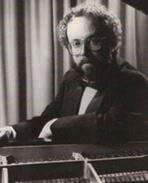
During his career, Jim served as both performer and college professor. He accepted his first professorship at Winthrop University in Rock Hill, South Carolina (198286) before he was asked to join the faculty of Southeast Missouri State University in Cape Girardeau, Missouri, where he taught for 26 years until his retirement in 2013. He performed extensively throughout the United States as well as Canada, Mexico, Europe, and the Far East. In 1988, he gave his solo debut at Carnegie Recital Hall and in 1990 released the first of four compact discs of live solo performances. In 1993, he was invited to teach as visiting professor at the prestigious Shanghai Conservatory of Music (PRC), and he served as master teacher at Operafestival di Roma (Italy) in 1995.

School of Music alumnus Francis Eugene Timlin (’80 DMA, Flute) died on Sept. 19, 2022 in Seattle. A longtime member of the Seattle Flute Society (SFS) who held many leadership roles through the years, Timlin was serving as SFS Historian at the time of his death; previously, he served for 31 years as the organization’s treasurer. Timlin held degrees in music from the University of New Mexico, the University of Utah, and the University of Washington. He joined the New Mexico Symphony at age 18, was the flutist for the Seattle Woodwind Quintet, and enjoyed playing chamber music as well. His doctoral dissertation was “An Analytic Study of the Flute Works of Jacques Ibert.”
MM,
Former students of longtime Music Theory Professor Jonathan Bernard organized a symposium in his honor in June 2022 at the Music Building to celebrate his retirement after 35 years on the School of Music faculty.

Organizers Bradley Osborn (‘10 PhD, Music Theory), Brian Cobb (‘06 DMA, Composition) and Christopher Stover (‘09 PhD, Music Theory) coordinated a concert of music by composers relevant to Bernard’s research interests as well as a day of paper presentations at the Music Building that involved a number of alumni who’ve gone on to successful careers as music theorists at a range of prestigious institutions.
Guest musicians at the Friday night concert included Mark Taylor (‘94 BM, Jazz Studies), Stuart MacDonald (‘19 MM, Jazz and Improvised Music), Steve Treseler (‘15 MM, Jazz and Improvised Music), Jesse Canterbury, Eric Rynes (MM, Violin Performance), Evan Jones, Luke Fitzpatrick (DMA, Violin Performance), and Rachel Yoder.
The concert featured the world premiere of La descente de l’ange, a piece by Bernard’s faculty colleague, UW composer Joël-François Durand, whose music has been an ongoing research interest of Bernard.
School of Music alumni presenting papers included Rich Pellegrin (‘10 PhD, Music Theory) (University of Florida): “Salience, Triads, and Transformational Counterpoint in Robert Glasper’s Improvisation on “North Portland”; Ciro Scotto (‘95 DMA, Composition) (Ohio University): “Distortion and the Aesthetics of Drone”; Jason Yust (‘07 PhD, Music Theory) (Boston University): “Tetrachordal Folding Operations Applied to Morton Feldman’s For Stefan Wolpe”; Chris Stover (‘09 PhD, Music Theory) (Queensland Conservatorium, Griffith University): “Proto-transformations in Cecil Taylor’s Early Work”; and Brad Osborn (‘10 PhD, Music Theory) (University of Kansas): “What has Reich Done with My Radiohead? Finding the tunes in Radio Rewrite.”
We are heartbroken to report the passing of Cécile Casali (née Cécile Farmer) on April 29, 2022 after a battle with cancer.
Cécile was a 2010 UW recipient of the bachelor of music degree in voice, student of Tom Harper, and a favorite student of former SOM Director JoAnn Taricani, in whose Rennaissance Ensemble Cécile sang regularly. As an undergraduate, Cécile performed the role of Lisetta in the UW Opera mainstage production of Haydn’s Il Mondo della Luna, directed by Noel Koran.
In 2012, Cécile entered law school at the University of Virginia and after passing the New York State bar exam, worked as a lawyer in a large firm in New York City, specializing in cross-border regulations and compliance. Cécile is survived by her husband, two young daughters, as well as three brothers and two sisters. Our heartfelt condolences go out to her family as we hold Cécile’s memory in honor.
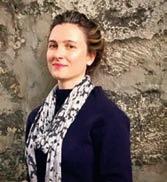
—Thomas Harper, Professor, UW Voice
Friends and colleagues of School of Music alumnus Bart Komoah (’10 MA, Ethnomusicology) were saddened to hear of his death Sept. 1, 2021 in Ghana after a sudden respiratory illness. Komoah had been living and working with Ghana Museums and Monuments Board in Kumasi; Ghana, since completing his master’s degree at the University of Washington in 2010. He is survived by his elder brothers and sisters; his wife Odette; two daughters; Valerie and Ayor; and extended family members.
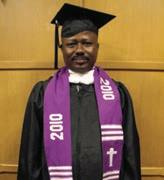
Komoah is remembered by his former teachers, students, and colleagues at the School of Music as a master performer and teacher of the large gyil xylophones of the Upper West region of Northwestern Ghana. Video recordings of his presentations of gyil performance are included among the extensive recordings of the UW’s Ethnomusicology Archives.
The faculty and staff of the School of Music send condolences to Bart’s family, friends, and all who knew him at the University of Washington.
When five School of Music piano students performed concerto movements with Seattle’s Philharmonia Northwest at Meany Hall in May 2022, they honored the legacy of the late Michiko Morita Miyamoto, iconic pianist and teacher whose impact on generations of Seattle’s young pianists has been profound—and continues to this day.

Along with her own artistic output and her influence as a private teacher of scores of Seattle music students, the late pianist co-founded the long-running Seattle Young Artists Music Festival Association with an aim toward creating memorable performance and competition opportunities for promising young musicians, including performances with Philharmonia Northwest and other regional orchestras.
Recently, at the UW School of Music, support from the extended family of the late artist has created an enduring source of support in the School of Music in the form of the Michiko Morita Miyamoto Professorship in Piano, currently held by Professors Robin McCabe and Craig Sheppard. They used resources from the professorship to bring Philharmonia Northwest to campus for the May performance. The professorship has also supported their own research and performance endeavors, including solo and collaborative recitals on the Meany mainstage. “We are incredibly grateful to the extended family of Michiko Morita Miyamoto for providing us the resources to create these wonderful opportunities for our community,” Sheppard says.
The students selected to perform last May were runners-up in the School of Music’s annual concerto competition, which identifies winners from three divisions to perform in a public concert with the UW Symphony. Normally just one pianist earns this coveted opportunity. By adding this concert featuring five additional top performers, the students’ professors have made a tangible, immediate impact on the educational experience of more students in their performance studios and broadened the scope of possibility for all.
As the students performed music by Rachmaninoff, Prokofiev, and Saint-Saëns, their professors listened closely. The legacy of Michiko Morita Miyamoto was highly evident in that moment and in the professors’ plans for the future, which include a February 2023 return performance by the orchestra with four additional UW student pianists.
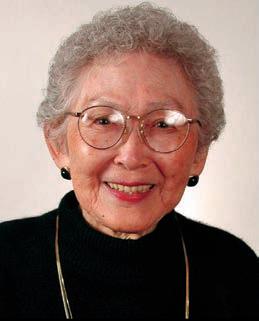
“Michiko Miyamoto was a meaningful and supportive presence in my life,” says Professor McCabe. “Her legacy of devoted and inspired teaching will continue as these professorships make possible the encouragement of gifted and devoted students.”
Upcoming 2022-23 performances receiving support from the Michiko Morita Miyamoto Professorship in Piano:
• Friday, Feb. 24, 2023: Philharmonia
Northwest with UW Piano students
• Thursday, April 6, 2023: Double
Play: Pianists Robin McCabe and Rachelle McCabe
• Monday, May 8, 2023: Craig Sheppard, Complete Chopin Nocturnes
All performances are at 7:30 p.m. at the Katharyn Alvord Gerlich Theater, Meany Hall.
Private gifts to the School of Music create important opportunities for our students, faculty and programs. Numbers (rounded to the nearest whole) from Fiscal Year 2021-22 reveal the depth of your impact. Thank you!
3,353,292: Dollars in total support
UW Music received from private donations in Fiscal Year 2021-22.
191: Total number of gifts to UW Music
35: Number of student support endowments that received new or additional funding
107: Number of students who received scholarship/fellowship support
92: Percentage of gifts under $10,000
To make a gift in support of UW students, call 206.685.6997, or make a gift online at www.giving.uw.edu.
Annual gifts to the School of Music provide important resources benefitting students, faculty, and programs
• The Friends of Music Fund provides the School of Music Director flexible funds for music student, faculty, and program support
• The Catch a Rising Star Endowed Scholarship Fund provides long-term scholarship support for undergraduate music students
Make a gift online or by phone at uwfoundation.org, or by calling 1-877-UW-GIFTS. Thank you for your support!
 UW piano students (let to right) Alice Liu, Kiwa Mizutani, Hanyan Zheng, Nicholas Tagab, and Yiyi Chen following their May 2022 performance with Philharmonia
UW piano students (let to right) Alice Liu, Kiwa Mizutani, Hanyan Zheng, Nicholas Tagab, and Yiyi Chen following their May 2022 performance with Philharmonia
Young up-and-coming musicians learning from their musical elders on the concert stage it’s a storied tradition running throughout the history of jazz and thriving in the nightclubs and concert venues where the artform lives and breathes. The tradition is also alive and well in the Jazz Studies program at the University of Washington, where collaborations between students, teachers, and guest artists have long been a hallmark of the program.
“The UW Jazz Studies program is always looking for ways to engineer cross-generational mentorship experiences for our students, as we believe it is perhaps the most important component of their education,” says Ted Poor, assistant professor in the program and faculty advisor for the annual student-run Improvised Music Project Festival (IMPFest), which brings touring musicians to campus to work and perform with UW students and faculty. It’s a model the program has built upon successfully since the festival’s inception in the mid-2000s. Now, a generous grant from Seattle’s Raynier Foundation is enabling the program to implement a pilot project over the next several years to greatly expand the variety and number of guest artists it brings to campus for student-mentor collaborations.
“The Foundation’s support will enable us to build on the successful model of our annual Improvised Music Project Festival by hosting a diverse array of world-class guest artists throughout the school year,” Poor says, adding that he estimates that the Foundation’s support will enable the program to host about nine guest artist residencies over a period of several years, including residencies by the featured artists for the 2023 IMPFest, composer/pianist Kris Davis and multi-instrumentalist Michael Libramento.
The guests will spend a week on campus in late April working intensively with the students before presenting public performances with them at the Meany Studio Theater on Friday and Saturday, April 28 and 29. But long before that, the students will already have begun to immerse themselves in the artists’ music.
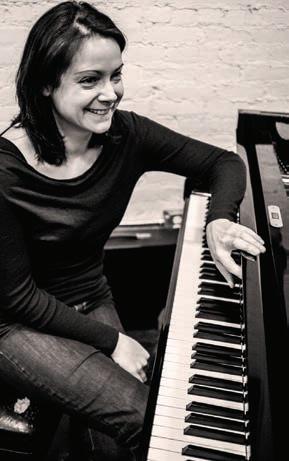
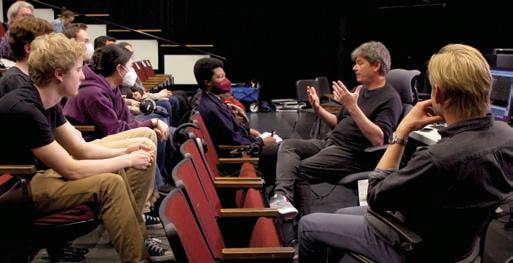
“With each residency, our students are tasked with approaching the situation as if they themselves have been hired to play in the guest artist’s band,” Poor says. “Prior to the guest artist’s arrival, the students learn that artist’s repertoire to the best of their ability, then spend a week of intensive work with the guest artist, culminating in a live performance. They confront a vast
Friday and Saturday, April 28 & 29, 2023
with guests Kris Davis and Michael Libramento
The School of Music and the student-run Improvised Music Project present two distinct nights of live performance featuring critically acclaimed composer/ pianist Kris Davis and first-call multi-instrumentalist Michael Libramento in concert with students and faculty from the UW Jazz Studies Program Performances are at 7:30 pm at the Meany Studio Theater. Details at music.washington.edu/23IMP.
range of approaches, styles, aesthetics, and temperaments, much the same as they will encounter as working professionals. It is demanding work that challenges our students to their core, and the rewards are significant.”
Other planned guests in the 2022-23 academic year include renowned Los Angeles-based recording engineer David Boucher, making a late January return visit to the UW. Boucher worked with students and faculty in 2022 when IMPFest became a week-long recording intensive without inperson performances. Using the School of Music’s new mobile recording system, Boucher worked with a variety of student and faculty ensembles to document new works, experiment with recording techniques, and teach fundamental recording and audio production skills.
In addition to the skills they gained, participating students benefited from opportunities to engage in deep listening. “As much as I love playing, I’ve really enjoyed sitting back here behind the desk with the headphones on and getting to watch and hear how things change,” said one participant, graduate student Beau Wood.
UW music student Jai Lasker called the recording intensive an “eyeopening experience” and said, “I’m feeling like I’m going to take a lot of what I learned and work that into whatever career I can make doing music.”
Whatever the artist, whatever the format, the outcomes of each residency are similar. “I’m certain the work we do strengthens the students’ ability to listen deeply and therefore to be better musicians,” Poor says. “At the conclusion of each residency, we see tremendous growth in our students in the areas of technique, musicianship, and, most importantly, in their individual artistic convictions. The progress gained from these experiences cannot be achieved in the classroom alone.”
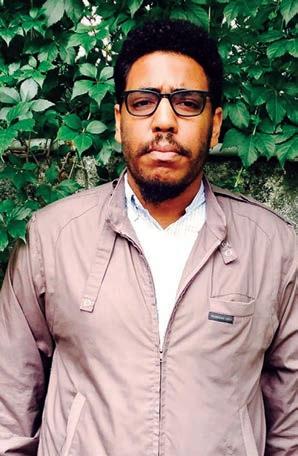
An update prepared for the School of Music by College of Arts and Sciences Advancement

Across our arts spaces, in our classrooms, and in partnership with the broader community, we are engaged in a crucial conversation about the future of the arts. How will our arts spaces and practices open doors to more students and community members? How will we nurture and elevate challenging and vital art and scholarship? And how can we foster an artistic laboratory for bold collaboration and exploration on our own campus?
As a leading public research university in a dynamic city with a thriving arts community, we have a unique responsibility and opportunity to foster arts progress in our region. And with world-class faculty, stellar students, and deep connections to the artistic fabric of Seattle, we are well-positioned for impact.
To this end, in 2020, College of Arts & Sciences dean Dianne Harris and UW provost Mark Richards committed to providing significant funding for a $15 million project to remodel critical, heavily used spaces in both the School of Art + Art History + Design and School of Music buildings. Through a public-private partnership, the University will invest $10 million, with private donations accounting for the final $5 million for both projects.
Renovations are occurring in two phases: construction on the Art Building began in spring of 2022 with completion planned for spring 2023. The Music building is phase two.
We are excited to share that we have begun fundraising efforts to renovate parts of the Music Building through a comprehensive campaign to modernize Brechemin Auditorium and an upstairs student recital hall with a recording room.

You will hear more about this campaign in the weeks and months ahead as we raise the $2.5 million needed to complete the work and leverage the initial University investment. The final scope of the project is dependent on fundraising success.
strategic enhancements as key spaces for student learning, arts engagement, and community access. Anchoring the north apex of the Arts and Sciences Quadrangle, the Art and Music buildings are home to the two biggest schools in the Arts Division: the School of Art + Art
History + Design and the School of Music. Serving arts majors and non-arts majors alike, the schools account for three quarters of the arts enrollments in the division, which also includes the School of Drama, the Department of Dance and the Digital Arts and Experimental
The Art and Music buildings have been identified as top University priorities for renovation and Planned renovations will transform Music Room 213, creating a more conducive environment for scholarship and music-making

Media Department. The Art and Music Buildings were constructed nearly 70 years ago and since then, much about the disciplines of art and music has changed.
Renovation plans for the School of Music include dramatic changes to the School’s 219-seat Brechemin Auditorium, one of the most heavily used spaces in the building. At present, patrons and students contend with obvious obstacles and signs of age, including the occasional broken seat, outdated technology, and an ongoing lack of easy access for mobility-impaired community members. Even so, the space is in high demand and plays host to at least 100 public events each year, including student degree recitals, ensemble performances, faculty and guest artist recitals, public lectures, talks, and more.
In addition, Music Room 213 will be updated to function as a lecture hall, recital space, and recording laboratory. This new and improved recital hall will create opportunities for intimate performances, group or solo recording, presentations, and special group activities that are not currently supported in our existing spaces.
Meeting our fundraising goal for the School of Music phase of the campaign will require our community of supporters joining together to invest the final $2.5 million. Our next fundraising milestone is to raise $1 million for Music by June 2023. This first $1 million will enable us to begin the project and release the first dollars from the provost and dean.
For additional information, please contact Stephanie Kornfeld, Director of Advancement for the Arts, at kornfs@uw.edu.
Planned improvements to common-area spaces will create a more accessible entrance to the Music Building and its classrooms and performance venues

The Music Building was a state-of-the-art facility when it opened in 1950, but seventy-plus years later, the needs of music students have drastically changed, though deep listening of musical recordings and score analysis remain an integral part of a musical education Photo: UW Libraries Special Collections

From 1927 to 1950, music classes at the University of Washington were held in a wooden frame building erected in 1909 for the Alaska-Yukon-Pacific Exposition and for a time used as the home of the University President. But on June 1, 1950, the School of Music took up residence in a new, five-story, state-of-the-art building at the head of the Arts and Sciences Quadrangle, the final building constructed in that iconic location.
By that time, enrollment in music classes at UW had topped 2,400 students.
The new building, designed by Whitehouse and Price of Spokane and constructed at a cost of nearly $2 million, boasted a 275-capacity student recital hall, 36 soundproofed practice rooms, an elevator to transport pianos from floor to floor, five broadcasting studios and rehearsing halls, and classrooms for music appreciation courses.
“A fine listening room, furnished with all modern facilities, has brought to the student body an unusual opportunity to acquaint itself, at leisure, with the masterpieces of musical literature,” wrote Music Professor Hazel Kinscella in an unpublished 1951 history of the School of Music. “The band, orchestra, and broadcast-reproducing rooms in the sub-basement are considered by architects to be the finest of their kind in the country.”
The new building also contained space for a departmental library, which devoted a small alcove to an Americana Music Center, housing Professor Kinscella’s collection of pioneer-era musical artifacts. A feature published in the Seattle Times on March 4, 1951 noted that the Kinscella Collection included a melodeon, or “baby organ” made by Mason & Hamlin in 1869. The instrument remains in the library’s collection today, resting just inside the front doors of the present-day Music Library.
We are grateful to our donors, alumni, and friends, whose generous and thoughtful support creates wonderful opportunities for our music students, faculty, and programs.
We regret any inadvertent errors; omissions will be included in the next issue of Whole Notes.
Friends of the School of Music receive invitations to special concert events in addition to recognition in programs and publications. To make a gift, please visit www.uwfoundation.org or call 1.877.894.4387. Thank you!
received July 1, 2021 to June 30, 2022
Gifts $100,000+
Janet Bogue & Paula Newberg
Kathleen & Neil Bogue Ross & Brenda Bogue
Stephen & Sarah Carter
Paul B. Fritts
Ronald Hull **
Raynier Institute & Foundation
Sarah Todnem **
Gifts $25,000-$99,999
Anonymous Gordon Hull Howard Hull & Nancy Pease
David Kechley
Deborah Person Gifts $10,000-$24,999 Yolande Siki Gifts $5,000-$9,999
Anonymous Victoria Bennett Robert Kechley & Elizabeth Kennedy Tonia Lindquist
Gifts $1,000-$4,999
American Guild of Organists
Alfred & Janet Berg
Kalman Brauner & Amy Carlson
Stephen & Sylvia Burges
Kate Hanauer
Tung Shing Leung & Cecilia Chung
Michael C. McGoodwin, in memory of Rebecca C. McGoodwin
A. Wayne & Marjorie Pietz
Philip & Kinza Schuyler
Laurel Sercombe & Darwin Alonso
JoAnn Taricani **
Gifts $500-$999
Joanne Bourgeois
Stanton & Sally Cole Warren & Verna Dogeagle
Karen Koon
Clint Kraus Gary Louie
Cary & Joann Oshima
Annie & Leroy Searle
Anne-Marie Van Wart & Lee Winkler
J. David & Catherine Wood
Virginia Wyland
Gifts $250-$499
Charles Alpers & Ingrid Peterson
William & Mary Hallauer Jr. Leigh & Richard Jones-Bamman Steve & Katherine Messick
Bruce & Carol Meyers Scott Oswald Lucio Pessoa John Roberts
Nicola Tollefson Marc Treyens

Margaret Van Gasken Christy Watson
John & Lynn Williams
Gifts $100-$249
Anonymous Marnie Arlen Darce Barager
Lisa Bergman & David Fluharty Boyer & Ritter LLC
Chien-Her Chin Thomas Crews Jr. Kelsey Croft
Peter Davenport
Penny & Dale DeGraff
Pierre Divenyi
Jason Dougherty
Bill Dubay
Eastern Washington University Ann Eggers
Kai Fujita
John Gibbs & Janet Ness
Cheryl Greengrove & Lin Provost Shan Han
Ryan Hare & Nicole LeBlanc
Charles Keagle Oliver Kou William Mahrt
JoAnn & Michael Matlick
Robin McCabe
Ann McLaughlin & Willard Wadt
Karen & Robert Mildes
Louise & Stafford Miller Marla Moon
James & Margaret Paynton Katherine Robbs Kenneth Rudolf Atsuko Savorgino Peter & Gail Schmunk
Steven Shaw & Sheila Feay-Shaw
Karen & Robert Shute
Linda & Blagoje Stankovic
Jan Stark
David Streatfield
Valerie Taylor
Ryan Whitney
John Yearsley
Gifts Under $99
Nathaniel Antonoplos
Penelope Armstrong
Dennis & Betty Behrens
Charisse & Bruce Berner
Tom & Virginia Dziekonski
Joan Giacomini
Scott Higbee
David Hirsch
Ross & Donna Hunt
Mary & E. Harvey Jewell
Gary & Debra Kahn
Shin-Hui Lin & Wilson Chin
Mark Montemayor
Theresa & Robert Ogan
Daniel & Karen Oie
Nathaniel Parton
Mina & David Payson
Suzanne Petersen
Fergus & Jane Prestbye
Lynn & Frederick Rupp
Pamela Ryker
Don Sayre
Jeanne Schmitt
Mary Schneider
Larry Shibler
Vivian Siao & John Long Tyan
Greg & Robin Smith
Susan Sykes Berry
The Red Door Music Studio
Joseph & Marsha Urlacher
Maria van Tyen
Nicholas Varela
Christopher & Erica Welch
** Deceased
Montserrat Alavedra Scholarship Sydney Belden
James L. Beech Scholarship
Constance Auguocha Caitlin Hennessy
Nick Hidy
Yunxi (Cicy) Li Mallory McCollum
Anna Perry Zach Rude Scott Fisher Ellen Kwon Katherine Lee
Eun Ju (Vivianna) Oh Rylan Virnig Daren Weissfisch
Hannah Chou Virginia Elizondo Sarah Santos David Lin William Storz
Luis Armando Rivera Doug Fullington
Boeing Endowment for Excellence
Marshell Lombard Tyler Kimmel Willam Storz
Jack Flesher
Julia Liseth Aguilar Jerez Greg Smith
Luis Armando Rivera
Neil M. and Kathleen Bogue Endowed Scholarship Matthew Chao Joely Loucks Alex Nguyen Dario Rojas Jessica Turner Trey Wheeler
Brechemin Foundation Scholarship
Nicholas Alfredo Tagab Christine Chu
Beau Wood
Katelyn Campbell Joe Krycia Hannah Chou
Sarah Santos David Lin
Virginia Elizondo
Joan Catoni Conlon Endowed Fellowship in Choral Studies to Honor Gerald Kechley and Miriam Terry Anjali Chudasama Leah H Wyman
Roy M. Cummings Endowed Student Support Fund
Jai Lasker
Galin Hebert
Rudy de Tornyay Fellowship in Opera Kenneth Foster
Barbara, Walt and David Dryfoos Music Award Endowment
EJ Brannon Pascal Lovre
Deborah and Meade Emory Music Award
Dalma Ashby Rylan Ferron-Jones Hannah Pena-Ruiz
Endowed Graduate Fellowship in Ethnomusicology
Jack Flesher
Erick Gustafson Endowed Music Scholarship
Cee Adamson Justin Birchell Anjali Chudasama Karen Dunstan Scott Farkas Kenneth Foster Rachel Huang Ian Huh
Mia Hye Yeon Kim Marshell Lombard Ivan Nolasco Hernandez Leah H Wyman Hanyan Zheng Fern Bettinger Karen Haining Grace Kim Anna Kucinski
Emily Lee Hannah Limb Neal Muppidi Elizabeth Nilles
Chloe Person Katherine Zundel Aaron Michael Butler Jack Flesher
Karissa Longo Hannah Pena-Ruiz
Jonathan Rodriguez Cooper Schlegel Daren Weissfisch
Barbara and Lynn Himmelman Endowed Scholarship
Ivan Nolasco Hernandez Ariona Thompson Karissa Longo
Kennan and Phyllis Hollingsworth Endowed Fellowship Kiwa Mizutani
Demar and Greta Irvine Endowed Scholarship
Julia Liseth Aguilar Jerez Kimani Bishop Sandesh Nagaraj Luis Armando Rivera William Storz
Roberta Jensen Endowed Scholarship in Music KatyRose Jordan
Travis Villegas Galin Hebert Jai Lasker
Louis G. Marsh Endowed Music Scholarship Ryan Baker Jenny Cooper Brindha Jaeger Billie Reafs Sophia Schmidt Scott Farkas Aaron Michael Butler Jonathan Rodriguez Kelly Hou
Metzler-de Llaguno Endowed Award Katherine Lee Johnson Gouvea De Oliveira
Nygren Family Endowed Fund in Opera Cee Adamson
Harvard Palmer Endowed Scholarship Justin Birchell
Adelyn Peck Leverett Endowed Fund Doug Fullington
Piano Scholarship Fund Chiao-Yu Wu Ruochen Liao Rachel Huang Ian Huh
Yunxi (Cicy) Li Xiaohui Ma Scott Fisher Karen Haining Ellen Kwon Anthony Sun Jack Flesher
Johnson Gouvea De Oliveira Hanyan Zheng
Dolores Plath Music Trust Fund
Elena Allen Dalma Ashby Christine Chu
Rylan Ferron-Jones Savannah Helming Sarah Johnson Sean Sasaki
Gina Funes Radke and Fred Radke Endowed Scholarship in Music KatyRose Jordan
Helen A. Reynolds Endowed Scholarship in Music
Megan Hutchison Mallory McCollum Anna Perry Caitlin Hennessy Nick Hidy Zach Rude Fern Bettinger Zachary Griffin Anmol Kaur Anna Kucinski Emily Lee Hannah Limb Neal Muppidi Elizabeth Nilles Katherine Zundel Curtis (Cee) Adamson Virginia Elizondo Eun Ju (Viviana) Oh Rylan Virnig Daren Weissfisch Justin Birchell Karen Dunstan Kelly Hou Greg Smith Kenneth Foster
Bernice Mossafer Rind Endowed Fund in Music Kelly Hou
Pauline and Paul Soder Memorial Scholarship
Savannah Helming Sarah Johnson Sean Sasaki Ning (Selina) Siow Constance Auguocha
Alice J. Sorensen Memorial Scholarship Cooper Schlegel
Paul D. Tufts Endowed Fellowship Fund Ryan Carraher
Paul D. Tufts Endowed Scholarship Fund Luis Armando Rivera
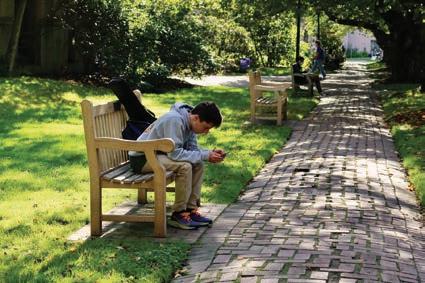
Louise Van Ogle Memorial Scholarship Doug Fullington
Ruth Sutton Waters Endowed Scholarship Anthony Sun
Walter C. Welke Memorial Scholarship Megan Hutchison
Marion O. Williams Endowed Scholarship Karen Dunstan Marqis Griffith
Hans Wolf Fellows Award for Graduating Seniors in the School of Music Kaelyn Barnes Mavis Chan Naomi Hoffman Sophia Parker
Box 353450 Seattle, WA 98195-3450
Nonprofit Organization U.S. Postage PAID Seattle, WA Permit No. 62
facebook com/UWMusic instagram com/uw_music youtube com/udubmusic music.washington.edu
